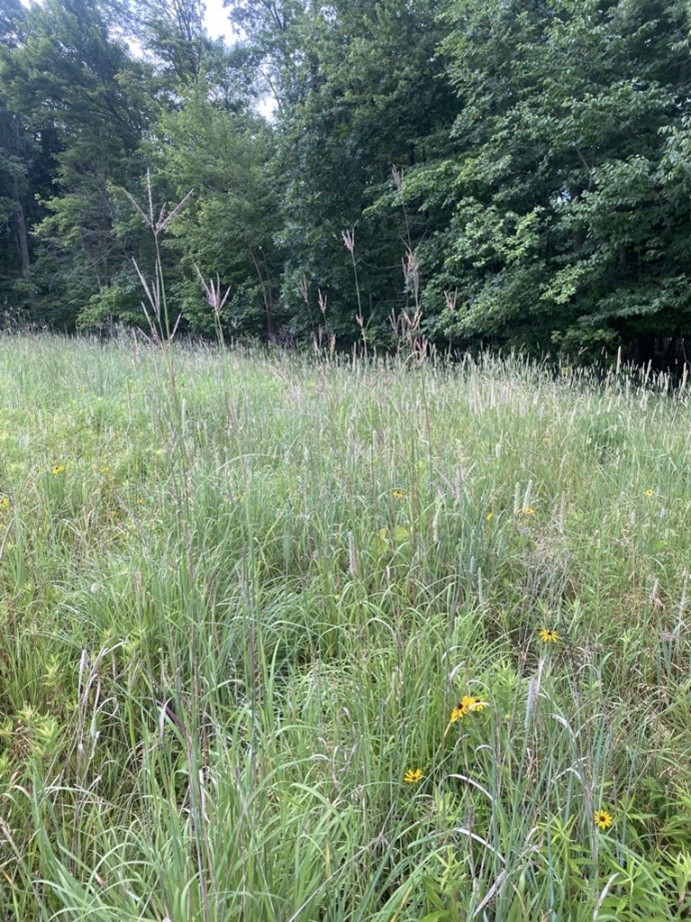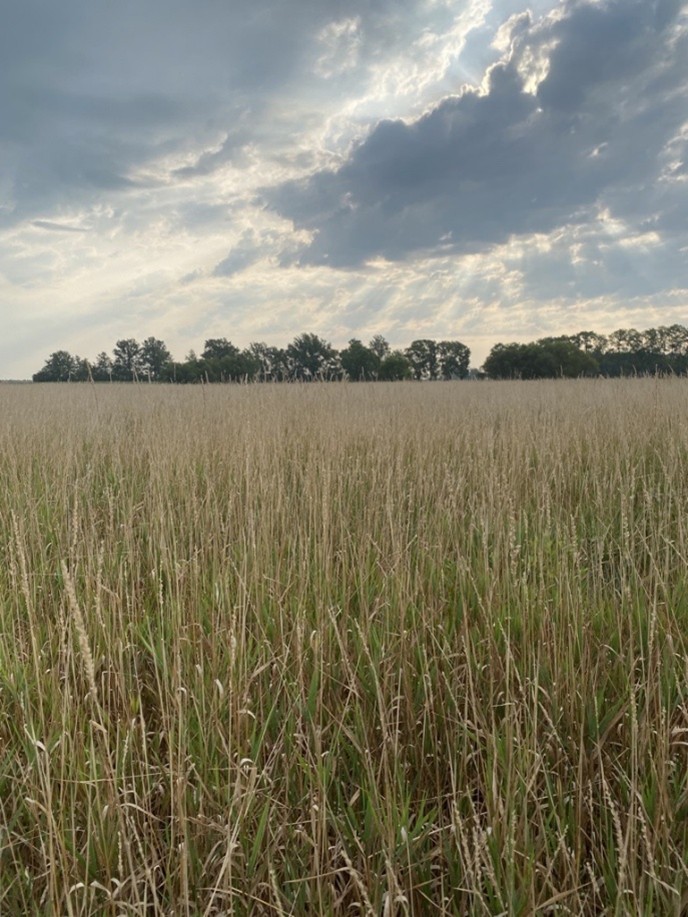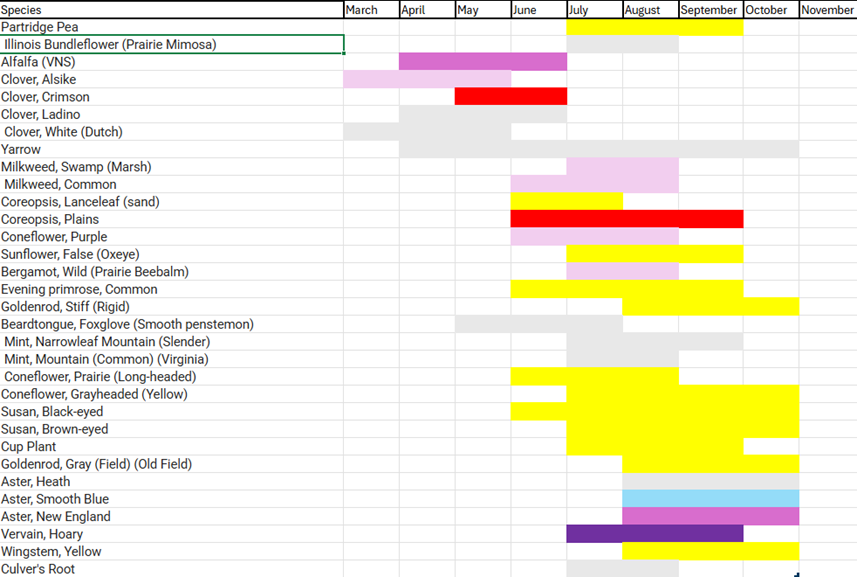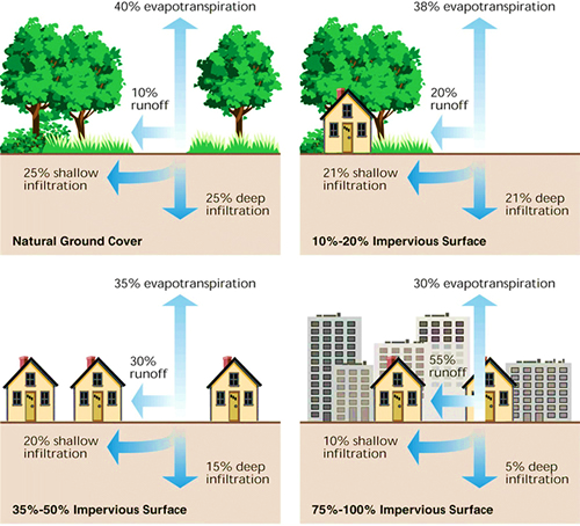Download and play our word puzzles for some interactive newsletter fun! We have a word search for little conservationists and a crossword for those of you who want more of a challenge.
News
Join us August 3-9 at the Richland County Fair!
While at the Richland County Fair, join us behind the Nature Park stage to learn about stormwater management. We’ll be sharing simple steps you can take to prevent stormwater pollution and protect our waterways. Plus, play our stormwater cornhole game to see how polluted stormwater can change clear water into water you don’t want to swim in, bathe with or drink. The Nature Park exhibit space is open from 11:00am to 7:00pm daily, and we hope you stop by to visit with us and other exhibitors like Richland County Solid Waste Management Authority, Richland County Master Gardeners, Richland County Park District, Mansfield Litter Prevention and the Richland Area Beekeepers.
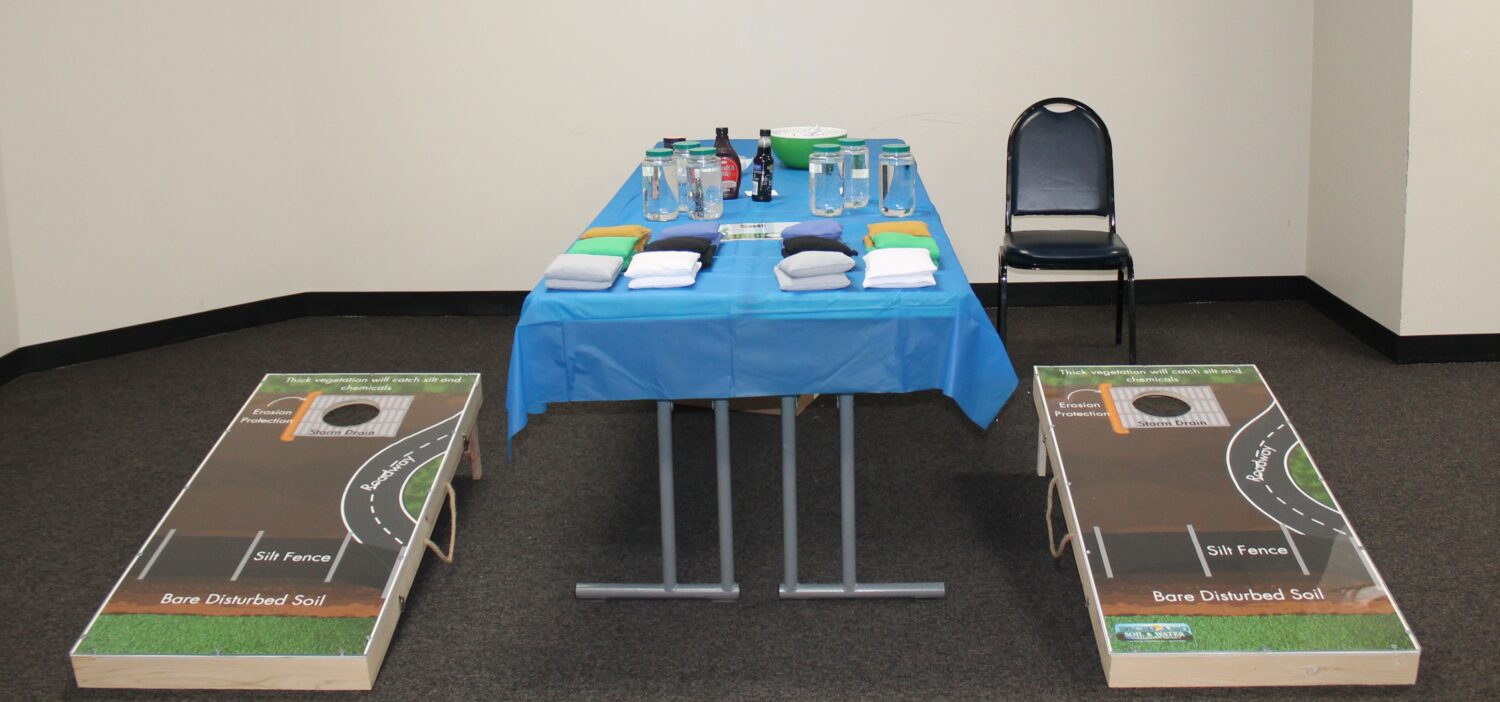
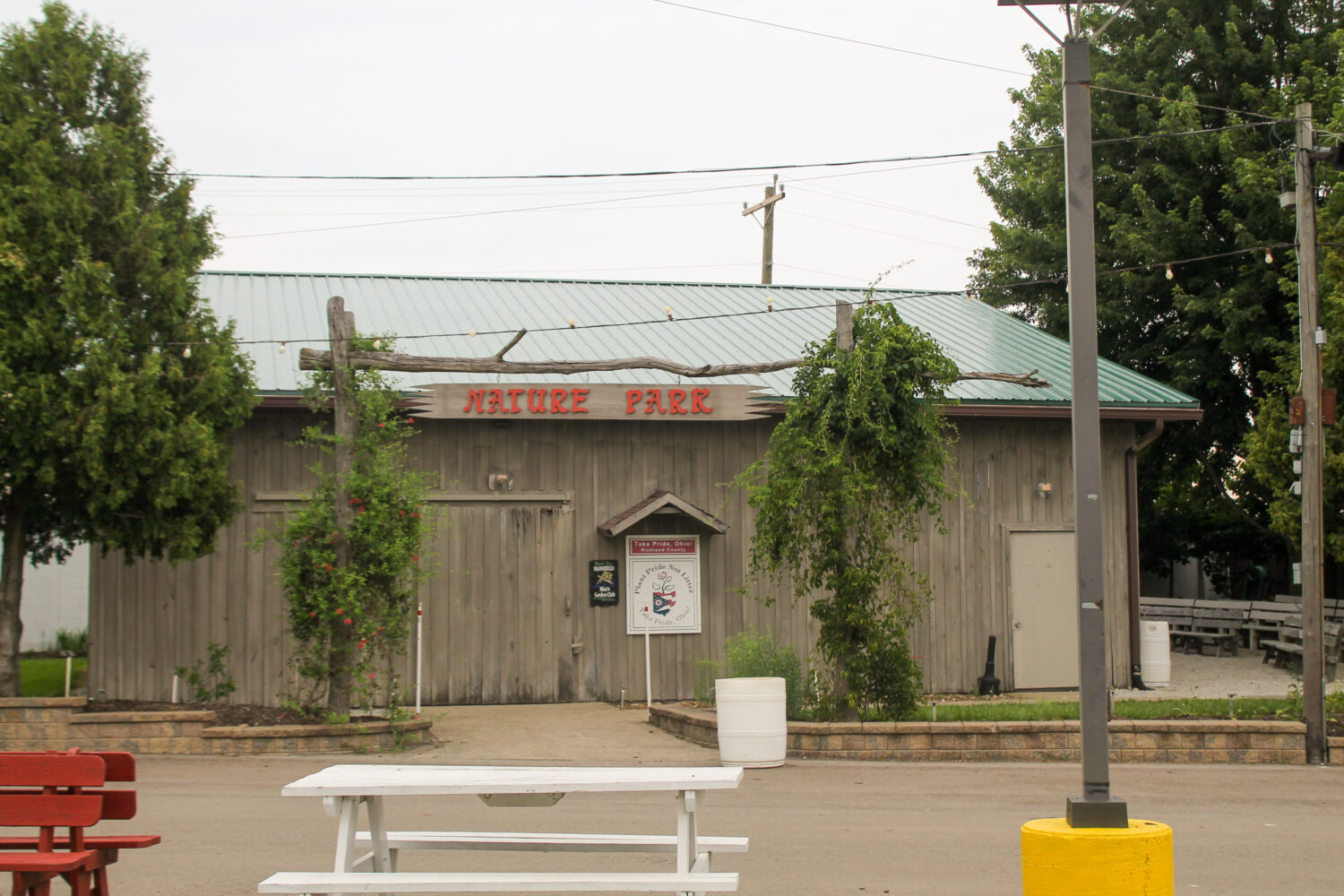

Highlights from the 2025 Land Judging and District 2 Forestry Contests.
By Matt Wallace
On September 12 Richland SWCD and the Richland County office of the United States Department of Natural Resources Conservation Service (USDA-NRCS) co-hosted the 2025 Land Judging Contest. Jordan Miller, Soil Conservationist from USDA-NRCS, and I oversaw the contest.
This year we had four schools participate in the contest, which was held at Malabar Farm State Park, with a total of 47 students competing in the contest. The top students from each school will continue onto the District 2 Land Judging Contest with the opportunity to move onto the State Land Judging Contest.
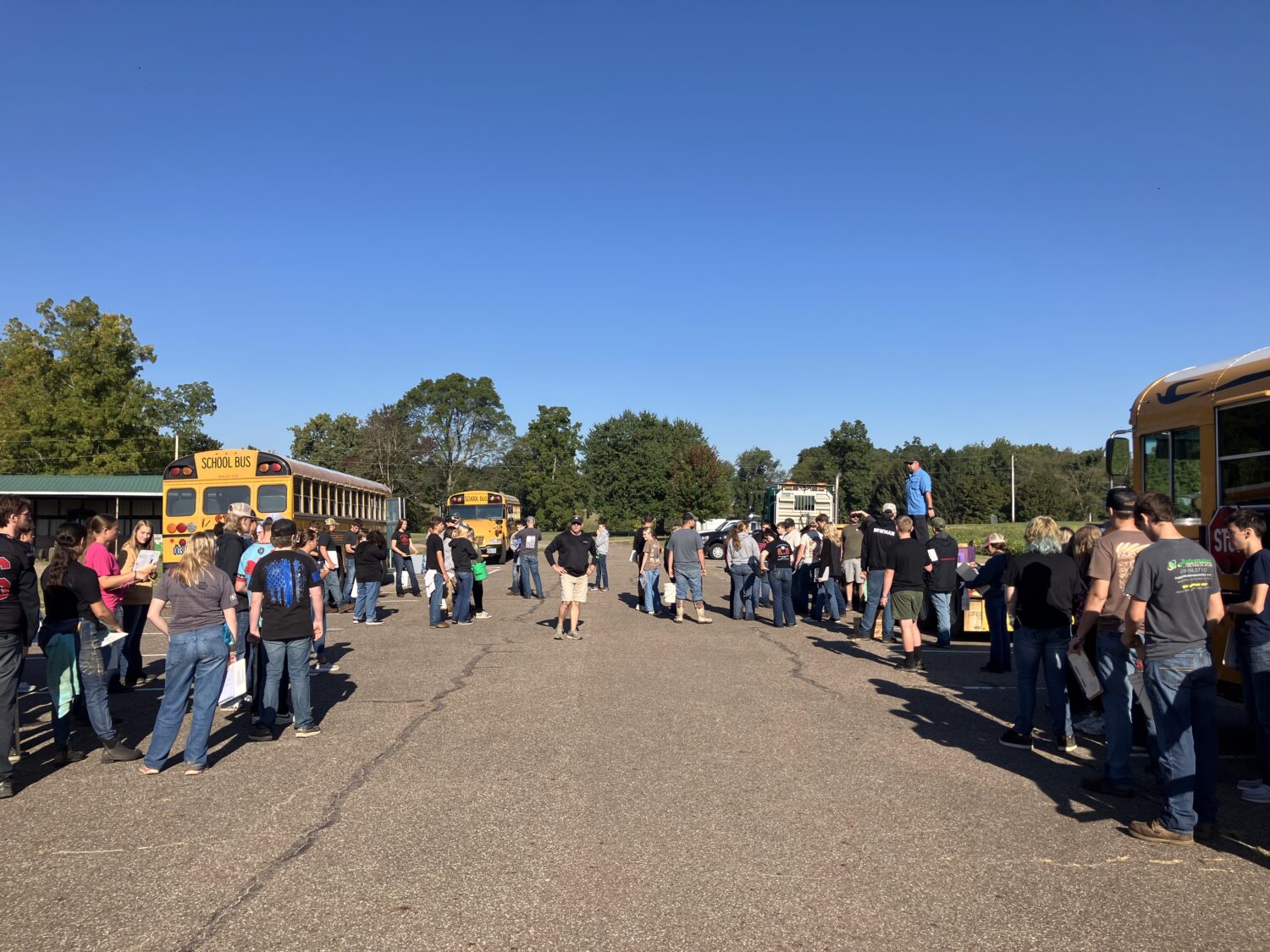
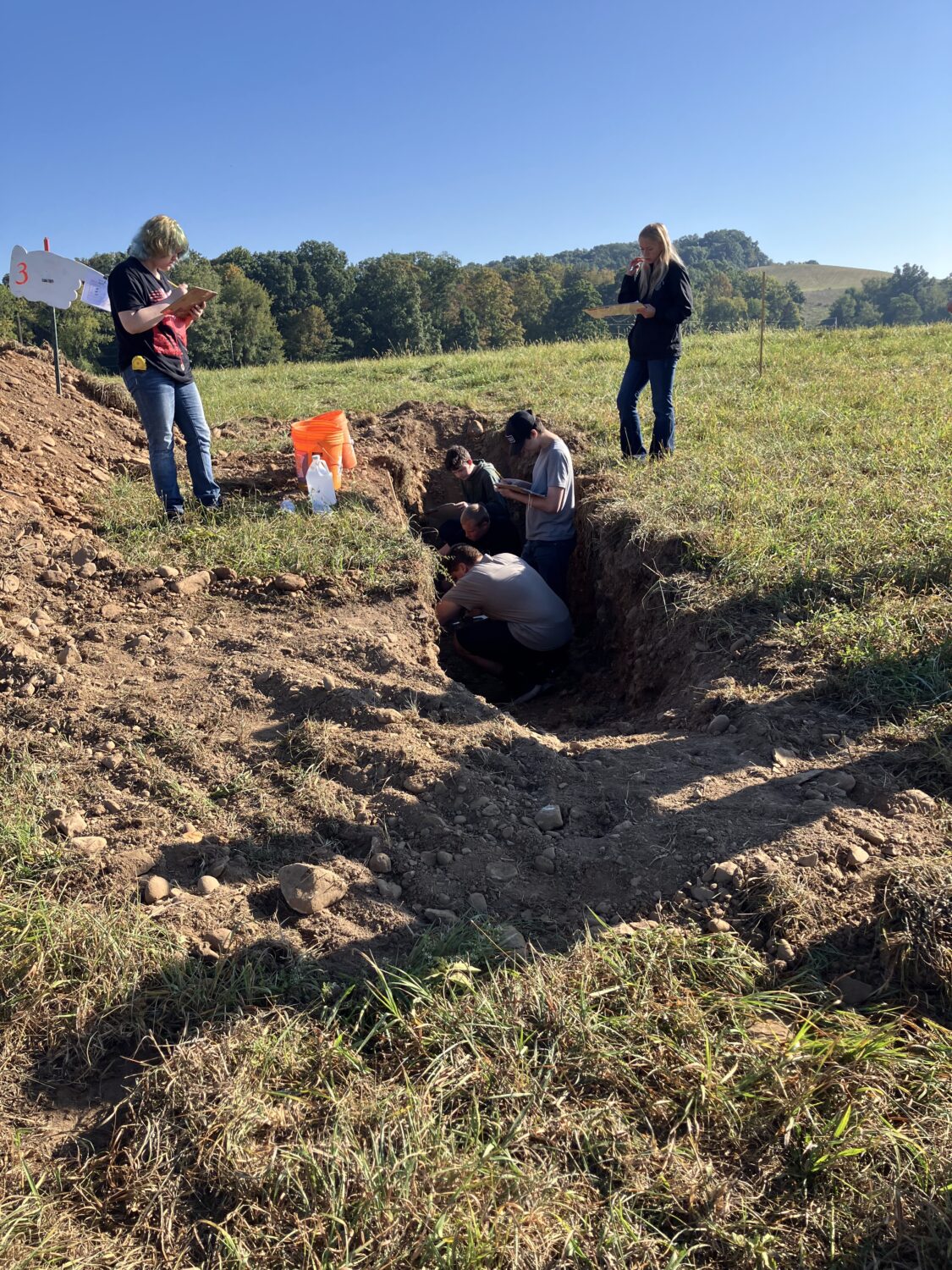
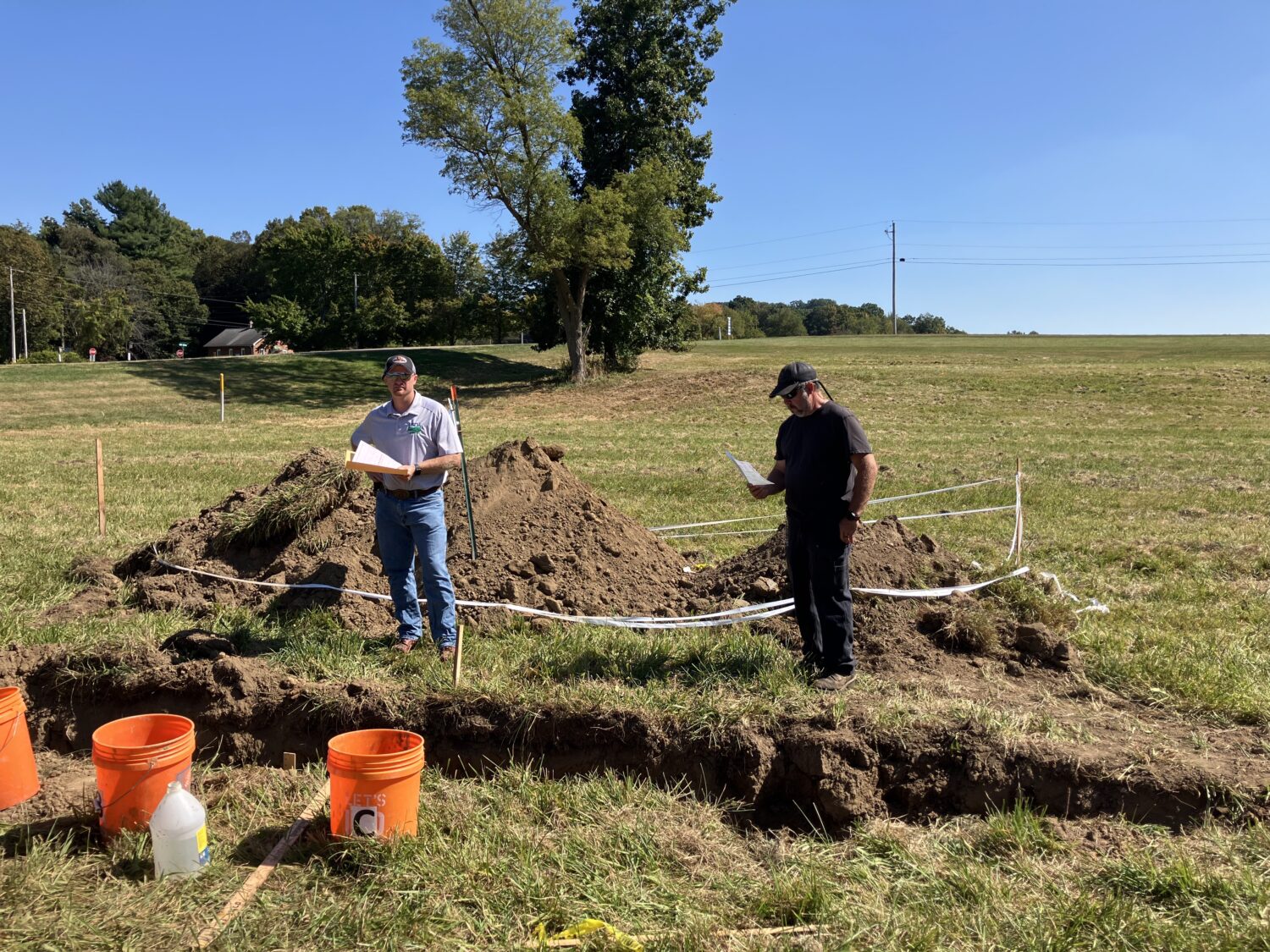
On September 18, Richland SWCD hosted the 2025 District 2 Forestry Contest for the first time since 2008. 150 students from a multitude of schools competed in equipment identification, chainsaw part identification, tree identification, timber cruising, general knowledge, timber stand improvement, as well as tree and forest problem identification. The top team will go on to the State Forestry Contest held later this month at the Hocking College campus. The District 2 contest was held at the picturesque Muskingum Watershed Conservancy District’s (MWCD) Pleasant Hill State Park with the assistance of the Park Manager, Aaron Miller, and his staff. Without their assistance this contest would not have been as successful as it was. We thank the MWCD staff for all of their assistance, and we look forward to working with them on this contest again next year.
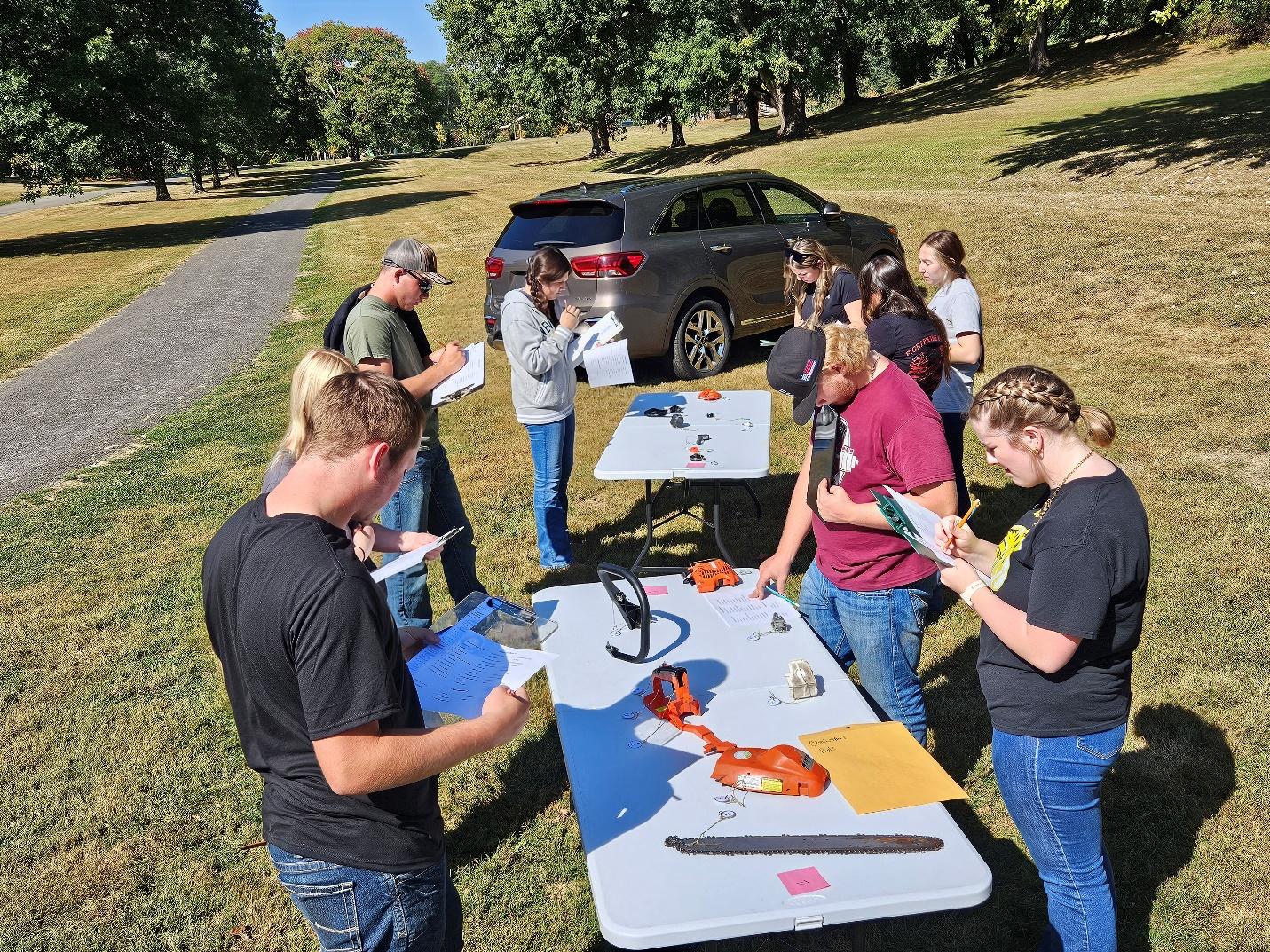
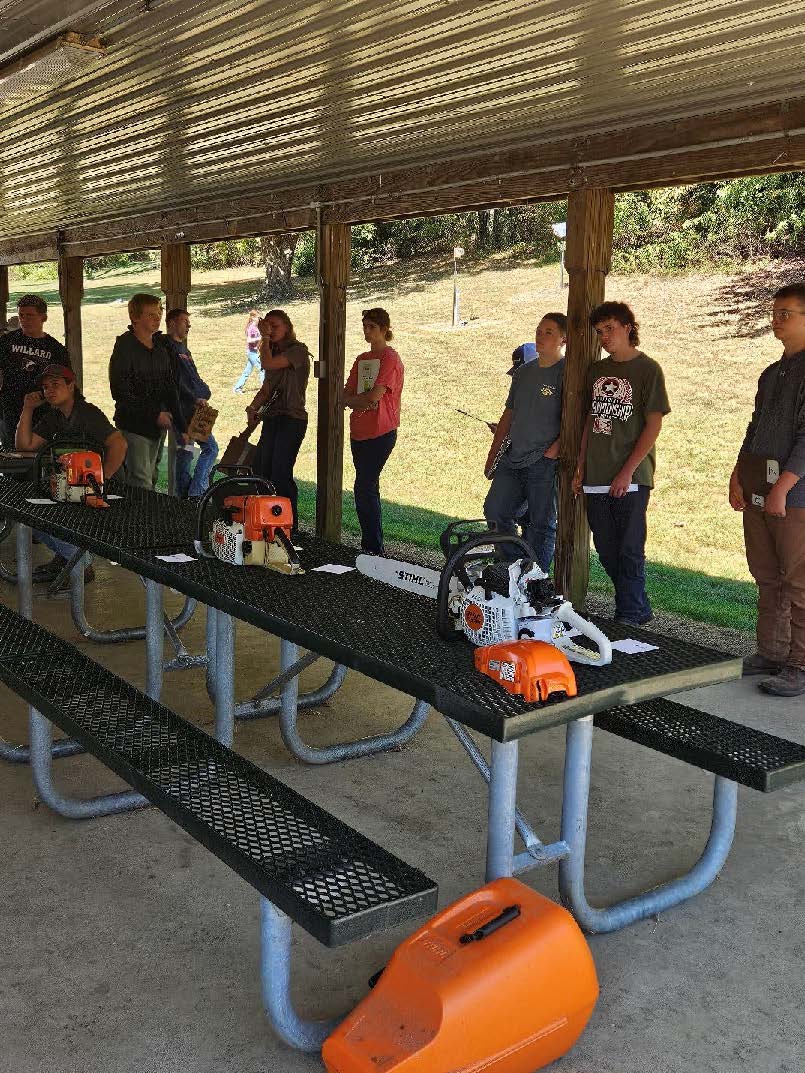
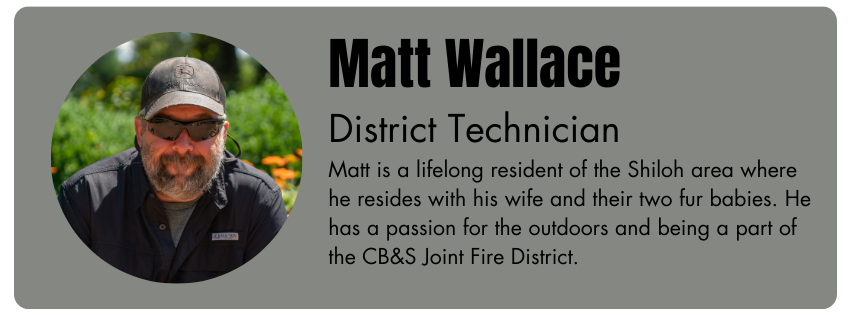
Summer storms and impervious surfaces mean faster runoff. Check out our updated data and tips to help slow the flow!
The spring rainy season has passed and now we’re in the summer season where rains can be less frequent, but a summer thunderstorm can be quite intense and can dump a lot of rain in a short amount of time. These rain events are needed but relate to a term we use here in the office a lot, impervious area!
Impervious areas are areas that are man-made and do not allow water to contact the soil. Instead, this water is forced to flow off this impervious area, eventually to some type of outlet. A typical outlet is a lawn, road ditch, street, storm sewer or stream. This means that the rain water now gets to an outlet a lot faster than it used to.
Imagine an empty lot full of trees, shrubs and grass. At this point, the whole lot would be considered pervious area. Pervious meaning that when rain falls on the land, it now can penetrate or enter the soil. Some of the water is taken up by the many plant roots. More water soaks into the soil, being absorbed as it goes down. It makes it’s way down by pores & holes in the soil made by old roots, earthworms, animals and insects. Eventually the rain would soak all the way to the water table and some would then be carried to streams. Some water makes it down even further to the ground water. This water has now been filtered by the soil and has recharged our ground water resources. Once the soil has become totally saturated, additional rain would not be absorbed and that water would become runoff, but as you can see it would take quite some time and a lot of water to get to this point.
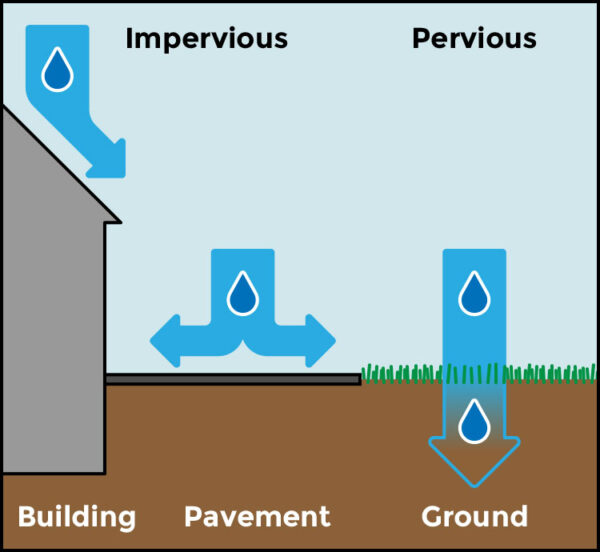
Now, imagine this empty lot has been sold to someone who wants to build a new home and garage. The soil will be disturbed and a portion of the lot will be developed into impervious area by way of roofs, driveways and sidewalks. That rain water will no longer make it to the soil. Since this water has nowhere to soak, it adds up fast! This becomes runoff immediately.
In the past, the accepted method to deal with impervious runoff was to gather it, put it into a tile or pipe and outlet it directly into a street, road ditch, stream or neighboring property. After many years and thousands of acres of impervious areas developed, it was observed that the rivers and streams began to widen, erode and change course drastically. This was due to all this impervious runoff getting to the stream too quickly and the stream was just adjusting to handle all of this rapid runoff.
Now we’ve learned from our past mistakes, and our focus is to slow impervious water down, giving streams time to handle the runoff. We’re not saying that development can’t happen, we’re saying impervious runoff needs to be managed.
The Stormwater Regulations of Richland County were developed for this purpose. Richland SWCD administers the Stormwater Regulations for the Richland County Commissioners.
On residential sites we encourage applicants to outlet water from their impervious areas onto the soil, on their own property, giving this water a chance to soak into the soils as it did before development. This unlocks the benefit of water soaking into the soil but also slows the water so it’s not getting to the stream too quickly.
On commercial projects, engineers design practices to hold back the very large amounts of impervious runoff that large commercial sites generate. These can consist of detention/retention basins, pervious pavement, rain gardens and underground detention.
Since Richland SWCD began administering the Stormwater program in 2000, we’ve been tracking the amount of impervious areas being developed in square footage. We’ve tracked residential, commercial and agricultural projects and we’ve recently updated our website to include this data all the way to 2024. Please check this out on our website.
If you want to do your part in reducing impervious runoff, you may want to look into installing rain barrels and/or rain gardens on your property. You can also change your downspouts so that they outlet onto your lawn. Even small steps like these help protect our streams and reduce the impact of impervious surfaces in our community.
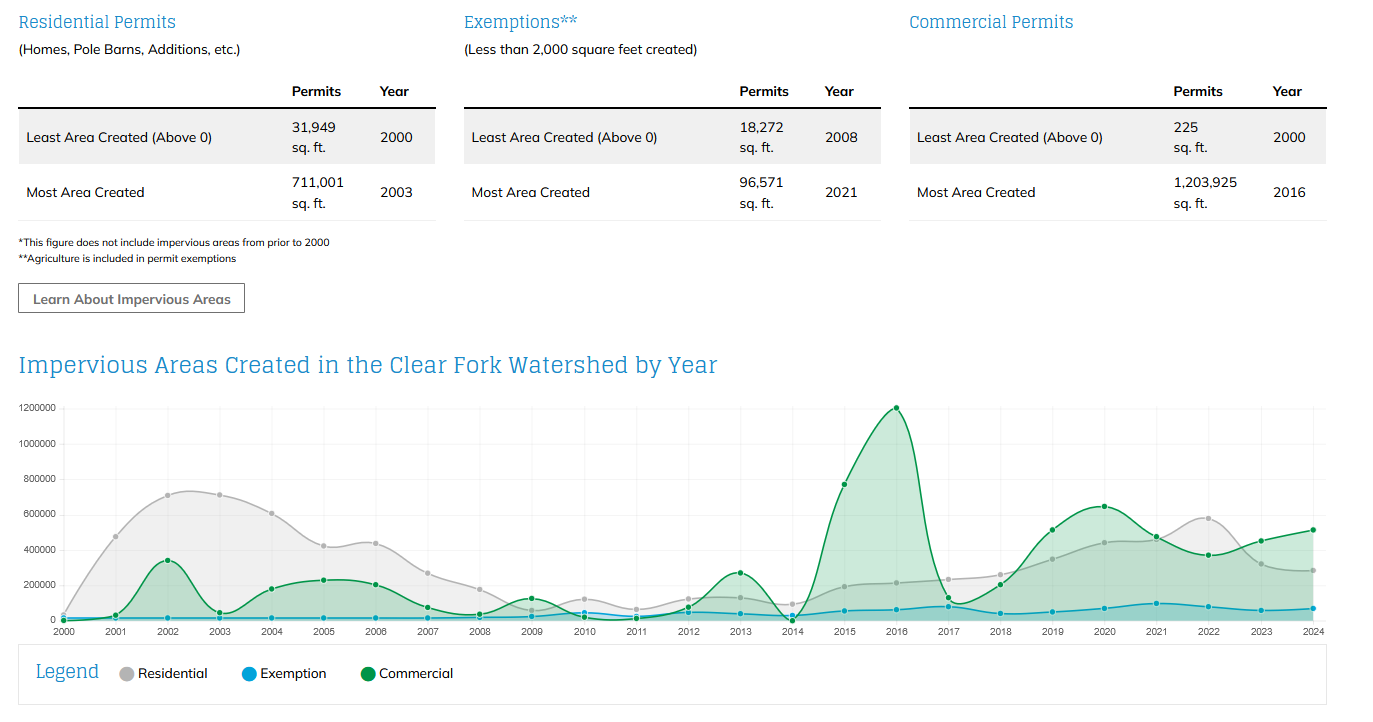

Our Calendar of Events is packed with exciting opportunities to learn, connect and get involved. Click to see what’s in store!
Enrollment for CY26/27 is still open!
As the 2025 planting season is (hopefully) winding down, we’re also winding down on our 2025 practices. This will ultimately bring our first multi-year H2Ohio contracts to an end. If a producer is interested in continuing with the program in 2026/2027, there is some important information regarding cover crops after 2025 harvest. There are a couple of options/scenarios to consider:
- If planning cover crops this fall for your current H2Ohio contract but you do NOT want to re-enroll for Crop Years 26/27 (CY26/27): You don’t need to do anything other than let Jordan know you won’t be participating in H2Ohio for CY 26/27.
- If you’re planning cover crops this fall and you plan on enrolling in H2Ohio for Crop Years 26/27: Let Jordan know. We’ll need to do a termination agreement after all other 2025 practices have been completed. This will cancel the cover crop practice for CY25 on your existing H2Ohio contract and we’ll enroll those fields for a CY26 Cover Crop under the new H2Ohio contract for CY26/27.
The benefit of doing things this way: The existing contracted payment for an overwintering cover crop is $25/acre. That same ground going into a cover crop this fall on a CY26 contract will pay $40/ac for cover crops on the same date you’d expect to start seeing payments go out on an existing contract CY25 cover crop (i.e. after March 15, 2026). A difference of +$15/ac for the same ground paid at the same time you would have received a CY25 cover crop payment.
Crop Year 2026/2027 Manure Update
2026/2027 Manure Incorporation & Utilization
If you’re planning on enrolling in the manure incorporation & utilization practice for CY26/27, there have been some changes from the current contract’s practice standard for manure incorporation. The practice is now called manure incorporation & utilization and has added ways for no-till operations to receive a manure utilization payment. Please take a look at the practice standard on our website or contact Jordan for a copy if you’re considering manure incorporation/utilization in CY26/27.
Signups for H2Ohio Crop Years 2026/2027 (CY26/27) Continue Through Early August
The application for H2Ohio CY26/27 is available now on our website. You can also email Jordan for a copy or with any questions about the program.
Contracts for CY26/27 will start rolling out in late August 2025.
Please submit your application and begin gathering the following information for nutrient management planning and development on the MyFarms platform:
- Up-to-date soil test information (i.e. 4 years old or newer). For CY 2026 soil test information from 2022-on are acceptable, for CY 2027 soil tests from 2023-on are acceptable.
- Planned crop types for CY26/27.
- Field maps for the eligible ground you’re interested in enrolling in H2Ohio (or field boundary files from your CCA or agronomist.)
- Prescriptions or fertility plan for CY26/27.
*The soil test data, crop rotations, field boundaries/maps and fertility plan aren’t required to be submitted with the application, however, this information will need to be submitted prior to the contracting period coming August 2025.
Also available on the website are the practice standards and work plans for CY26/27. The practice standards are the minimum requirements that producers need to meet in order to receive payment for completing the practices. Work plans were designed to help producers successfully implement the practices.
If you’re interested in enrolling in H2Ohio for Crop Years 2026/2027, please submit your application as soon as possible. There is an enrollment cap of 800,000 total acres in the Western Lake Erie Basin (WLEB) program area with the 2026/2027 contracts.
As a reminder, Richland County is on the WLEB H2Ohio schedule meaning acres in the following counties will be eligible to enroll through our office for crop years 2026/27: Crawford, Erie, Huron, Marion, Ottawa, Richland, Sandusky, Seneca, Shelby, & Wyandot.
If you have any questions about the program or application, please do not hesitate to contact Jordan.

The Ohio Soil and Water Conservation Commission will cause an election of Supervisors of the Richland Soil and Water Conservation District (SWCD) to be held in accordance with Chapter 940 of the Ohio Revised Code.
The Ohio Soil and Water Conservation Commission will cause an election of Supervisors of the Richland Soil and Water Conservation District (SWCD) to be held in accordance with Chapter 940 of the Ohio Revised Code. Individuals who own or occupy land within the Richland Soil and Water Conservation District and are 18 years of age or older may vote for Supervisor.
There are 3 ways an eligible voter can cast a ballot:
1.) At the SWCD office, 1495 W. Longview Avenue; Suite 205-B, Mansfield, from 8/14/2025 until 9/11/2025 during normal business hours; or
2.) At the SWCD Annual Meeting, which will take place at Area Agency on Aging- Hawkins Center located at 2131 Park Avenue West, Ontario on 9/11/2025 from 11:30 AM to 12:30 PM ; or
3.) Voting absentee from 8/14/2025 until 9/4/2025, by requesting the ballot application and election ballot from the SWCD office at the following address 1495 W. Longview Ave; Suite 205-B, Mansfield, OH 44906, by calling 419-747-8686, or email election@richlandswcd.net. Absentee ballots must be received by the SWCD office by 9/11/2025 at 8:30 AM.
Supervisors will be elected to a three‐year term commencing January 1, 2026 and ending December 31, 2028. The Board of Supervisors create an annual and long-term plan of operation that protects the District’s mission and vision and are interested, conservation-minded, local leaders who promote conservation of the county’s natural resources through education, planning and technical assistance which are key to the success of the District. Supervisors are elected to a three-year term as a public official and serve without pay. Supervisors advocate for the District, attend and participate in monthly board meetings, assist with District programs and services and attend area and state meetings.
Nominees are:
- Leonard N. Fox
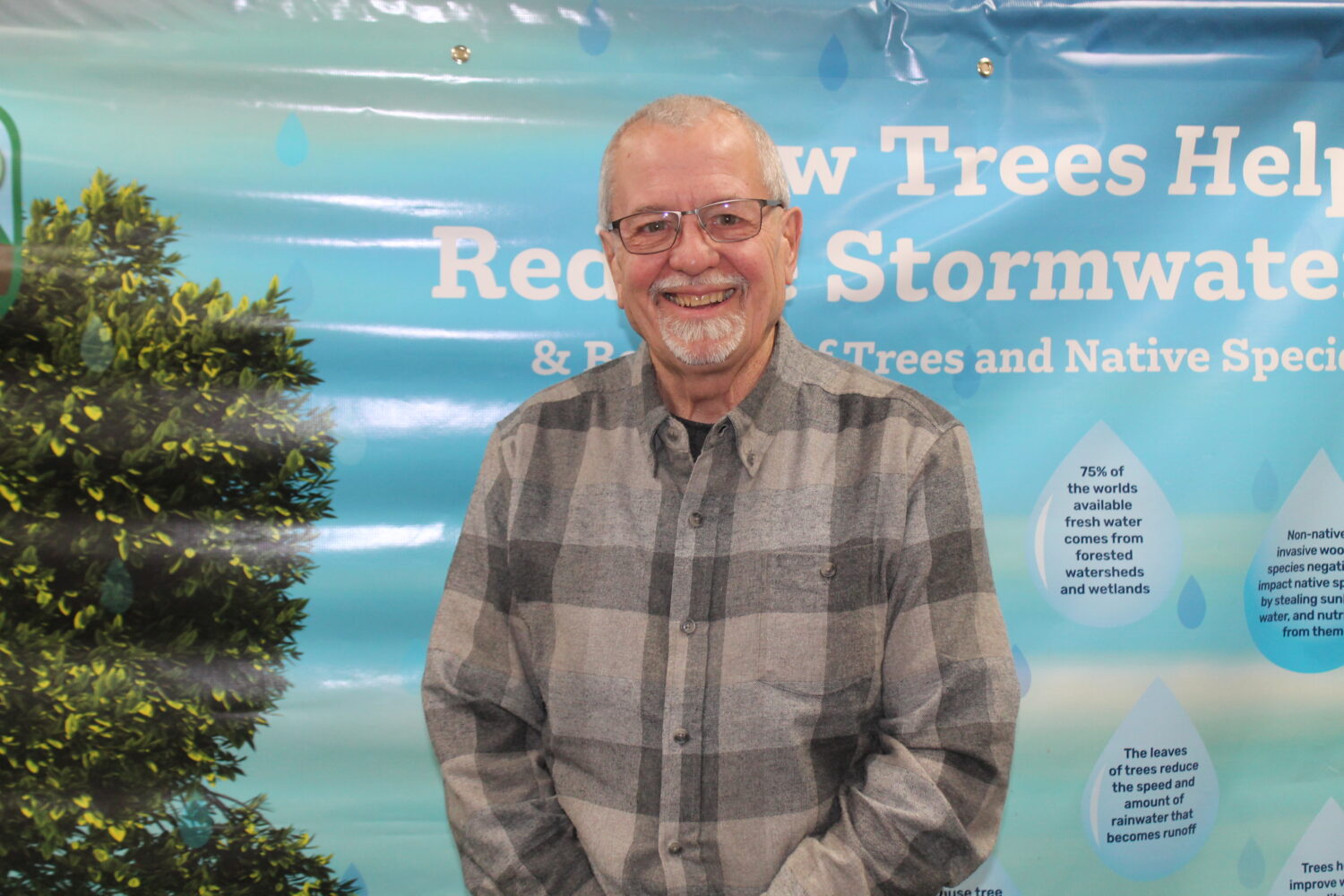
Hot weather and heavy rains can stress ponds and create drainage issues. Learn simple ways to keep your water healthy and your yard dry.
With extremely hot weather and heavy rapid rains ponds can get stressed due to the potential for the water column to flip and/or an influx of nutrients from nearby properties. As a result, you might see rapid water level increases and algae or aquatic plants growing. These things may cause an oxygen depletion in the water column and could cause a fish kill.
So, the question then becomes how do we fix some of these things? Algae blooms are driven by high nutrient loads within ponds which come from leaves, grass clippings, fertilizers and other material deposited into your pond. While a little bit of this material, commonly known as muck, is normal and can be broken down within the aquatic ecosystem, too much of it can be harmful. How do you tell if you have too much muck in your pond? Simply by walking around the inside edge of your pond! Pay attention to how much you sink into the inky black material and how it envelopes your feet and legs. The deeper you sink, the more of this highly nutritious, nutrient laden muck your pond has. The best way to help your pond digest muck is by adding beneficial bacteria, which are live active bacteria that help break down the muck and restore the volume back in your pond. Often the more muck that is in the pond, the more treatments you will need which are generally completed in the spring and fall of the year. Pond aeration can also help by increasing oxygen levels and boosting bacterial activity.
For sparse rooting and floating aquatic vegetation adding species of fish like grass carp, tilapia (which will not over-winter in Ohio) or channel catfish that eat these plants will also restore volume to your pond. There are occasions where you may want to consider dredging your pond and we recommend that you contact a Richland SWCD technician who can help make recommendations. By increasing the volume and supplementing oxygen in the pond you will help make your investment not only look better but be more hospitable for the fish and other aquatic friends within. Some additional things you can do to help your pond is by leaving the grass taller around it to help filter out sediments and nutrients that could come in from overland flow. You can also utilize native switch grass plantings, often times marketed as ornamental grasses, in areas of high flow. In which they will help slow down water, increase water infiltration, and help reduce sediments and nutrients from overland flow.
Wet Spots and Your Property
Do any of these look familiar to you?


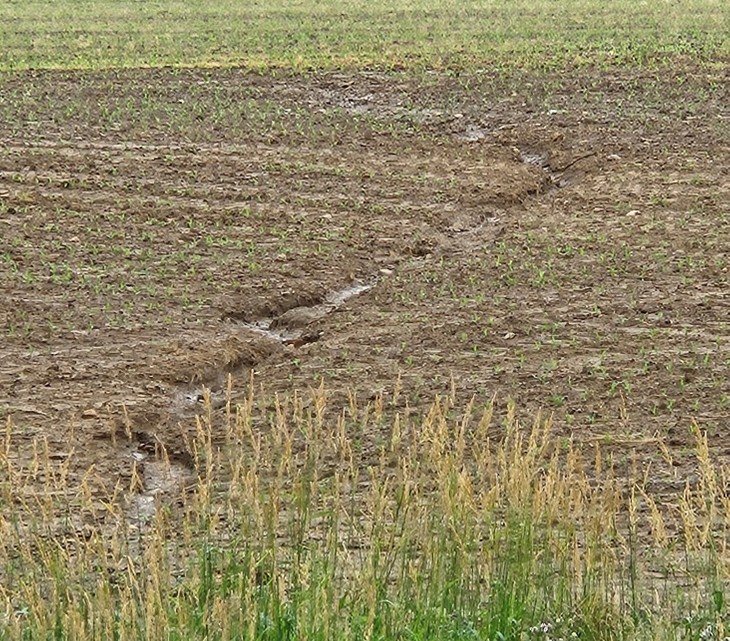
When it comes to wet spots in yards and fields there are options for landowners to improve drainage. Some options may be more appealing due to financial cost, topographic feasibility or personal capabilities. In no particular order things that homeowners can choose from are:
- Installing a tile to remove surface water if you have an area on your property that can allow it to drain without causing you additional issues.
- Installing a French drain to help with potentially excessive rainfall inundation.
- Adding soil amendments like gypsum, perlite and organic matter
- Reshaping the low spot so that it has positive drainage.
These options can also help with areas that retain rainwater for long periods of time, we may recommend obtaining a soil test before selecting one of these potential solutions so that you get more bang for your buck. The Richland Soil and Water Conservation office can offer assistance over the phone but usually a site visit is recommended so that we can visually observe the entirety of your concern. Services like this are provided to the public for free.

Download and play our word puzzles for some interactive newsletter fun! We have a word search for little conservationists and a crossword for those of you who want more of a challenge.
Spring 2025 Answers
New Summer Puzzles
Join Sam as he digs into the world of worm composting!
You may remember way back to our Autumn 2024 newsletter when I composed “Small Space, Big Impact: Urban Composting”. In that article I shared a brief overview of a couple common composting practices. That article didn’t mention it, but I was simultaneously starting my own journey with vermicomposting at my home in Mansfield, on my front porch. I purchased roughly 1,000 worms (~1lb) and set up my Worm Factory 360, shown on the right. Everything seemed to be going smoothly until the very next morning I discovered every single one of my worms had escaped. Little did I know that I missed a crucial first step that would ensure my failure. I’m going to use this article to provide some basic information on vermicomposting and point out some tips I’ve learned along the way.
Losing my first batch of worms was a letdown because not only was I looking forward to composting, but I had also invested a lot of money in this. In 2025, one pound of worms is approximately $50.00 plus tax and shipping. Some friends and family have asked me, “Sam, why don’t you just dig up some worms in your yard and use those?”, to which I respond only a small number of worms are useful for composting. The Rodale Institute states that typical earthworms are soil dwelling, don’t process large amounts of food waste and don’t reproduce well in confined spaces. The most commonly used worms for composting are Eisenia fetida, referred to as Red Wigglers. According to Rodale Institute, red wigglers are preferred because they have a quick reproduction cycle, feed near the surface of their substrate and are communal, meaning they don’t mind sharing living space with others. These worms are also rapid feeders; under ideal conditions a colony can recycle half their weight in food scraps daily (NCSU).
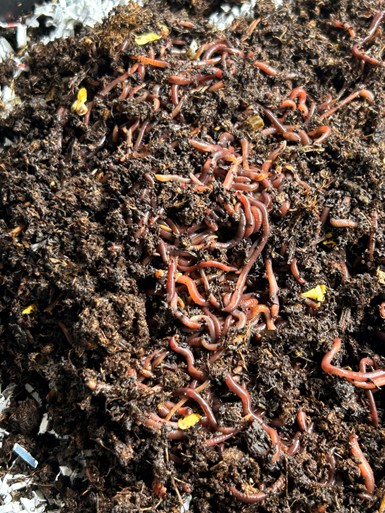
So where did I go wrong and what have I learned? Well, the biggest issue with my first batch of worms was improper acclimation to their new home. After setting up my bin, I closed the lid and walked away. I should have placed the open bin under an artificial light source for 24-48 hours. NCSU states that worms have a distaste for light and will tunnel into their substrate when light is present. Introducing light in those critical first couple of days teaches the worms to burrow downwards and explore their new space. I also went quite light on substrate; worms need space to move around and explore so loosely fit as much substrate as possible in your given container. So, with a few lessons learned I decided to buy another thousand worms and give it another go. At the time of this writing, I am about a month in, and it is going very well! I am feeding the worms kitchen scraps about once a week. So far, their feedings have consisted of eggs shells, used coffee grounds, carrots, various potatoes, blueberries, strawberries, celery, zucchini, squash, and green beans. I freeze my food scraps for a few days before feeding to help break down cell walls for quicker recycling. In these early stages it’s critical to temper your expectations; not every single scrap is going to be able to make it into your bin. Make sure the previous week’s feeding has been mostly consumed before adding in another. One could start with more worms for faster composting and the ability to compost more items at a time as well. Also remember that what you put into your compost is what you’re going to get out of it.
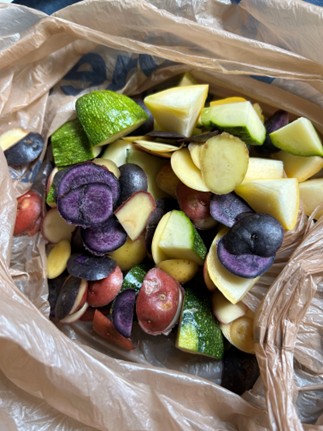
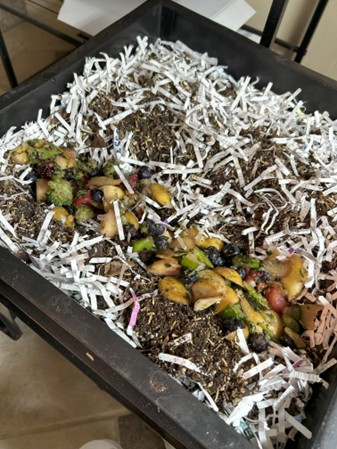
It feels great to be keeping these scraps out of the landfill and I’ve truly noticed a decrease in how much rubbish we are setting out at the curb each week. I never realized how much we were throwing away until I started collecting it. I’m also really looking forward to having some fresh “black gold” for the garden and all our various houseplants. Composting is something my son is interested in as well and it’s been a fun bonding experience for us both. I think it’s important to get the kids to think about conservation early and this is a perfect way to do that. Thanks for reading this far and stay tuned to our newsletter for future updates on my composting journey!
Learn More!
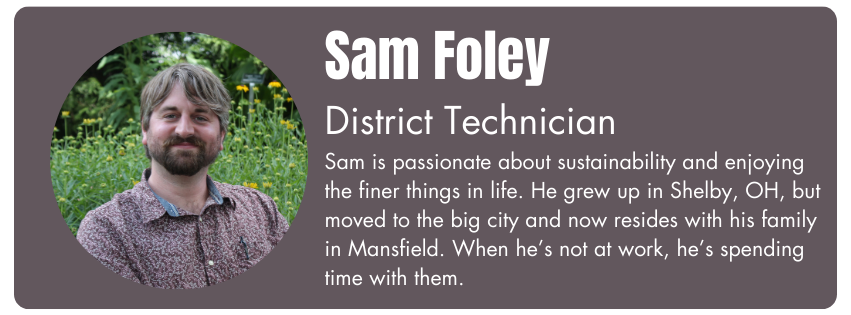
Find out if your site is in compliance with the local stormwater regulations plus permit numbers from the second quarter.
Our 2nd quarter of the year brought in many stormwater permits. We issued 14 permits for commercial projects between April 1, 2025 and June 30, 2025. We also issued 72 residential permits during that same time period with 48 of those being some sort of exemption. Please remember, if you are moving soil in the unincorporated areas of Richland County you need to consult with us about a stormwater permit to ensure you are following the Stormwater Management and Sediment Control Regulations of Richland County.
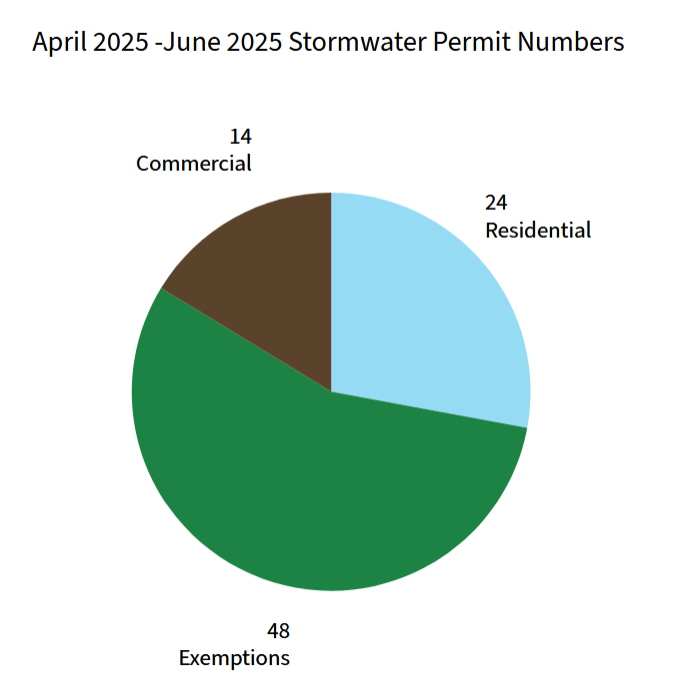
And now for a Stormwater Minute: Did you know that Agricultural projects are NOT exempt from the county’s Stormwater and Sediment Control Regulations? While agricultural construction is typically exempt from building and zoning regulations (still check in with each of these departments if you have an ag project), it is still subject to stormwater permitting requirements. We require site plans and the permit application to be submitted to our office. We inspect projects that go over the 2,000 square foot threshold outlined in the County’s regulations. Stormwater Permits for Agricultural projects are fee exempt though and never cost the farmer anything.
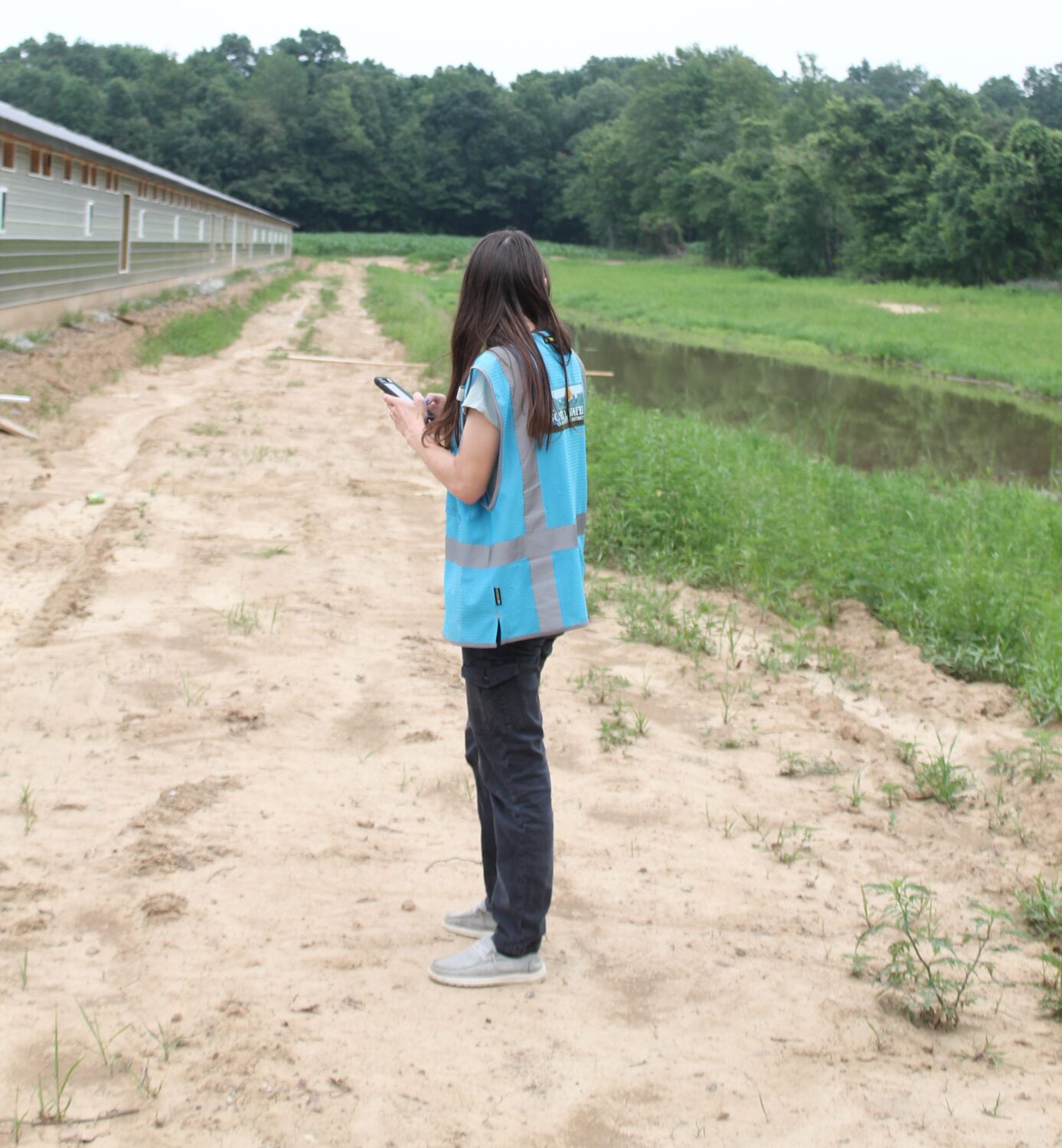

Our Calendar of Events is packed with exciting opportunities to learn, connect and get involved. Click to see what’s in store!
Seasonal tips for seeding, establishing and managing native stands.
Summer and fall are the perfect time to start preparing the land you’re considering changing to native wildlife cover. Whether you’re converting an old crop field or a turf grass/ lawn conversion, let’s discuss how to get the most from your planting.
Agricultural field conversions are easiest to complete due to the weed bed being suppressed for food production, and post-harvest you’re planting in a rather clean seed bed. Fields coming out of soybeans are the ideal landscape to plant in. If coming out of corn, fodder may need to be raked and baled off for adequate seed to soil contact.
Lawn conversions require a bit more site preparation than agricultural field conversions due to the aggressive nature of turf style grasses. Mow and allow the vegetation to grow back at least 6 inches. Then follow up with multiple blanket-herbicide applications, one application in the fall and spring are necessary to kill off the current cover. There are other methods for terminating grass cover currently established on the site if herbicides are something you’d like to steer away from, but each method has its own drawbacks on the environment and your planning timeline. Repeated tillage, solarization via black plastic and putting the parcel into a crop rotation for a few years are options as well.
When planting native stands, you can either drill in the seed or broadcast it across the surface of the soil. When drilling, ensure you’re using a Great Plains, native, no-till grass drill as native seed needs planted no more than 1/8 – ¼ inch below the soil surface. In my professional opinion, using a drill is most effective during the spring planting time frame, whereas broadcasting is most efficient in the dormant frost seeding season. By broadcasting seeds in the dormant season, we are able to mimic processes that occur in nature. The best time to broadcast seeds in this time frame is after a light snow. This way you’re able to see the seed as it’s placed across the landscape, ensuring an even rate of coverage. Set your broadcast spreader to ½ the recommended rate per acre and complete two passes, perpendicular to one another, for the most even coverage. When seeding native species, the planting windows are as follows: spring season (Mid-March – June 1) and the dormant season (December – Mid-March). Plating oats with the native seed is a great way to control soil stability in the first year of growth in the stand while native plants focus on their complex root structure.
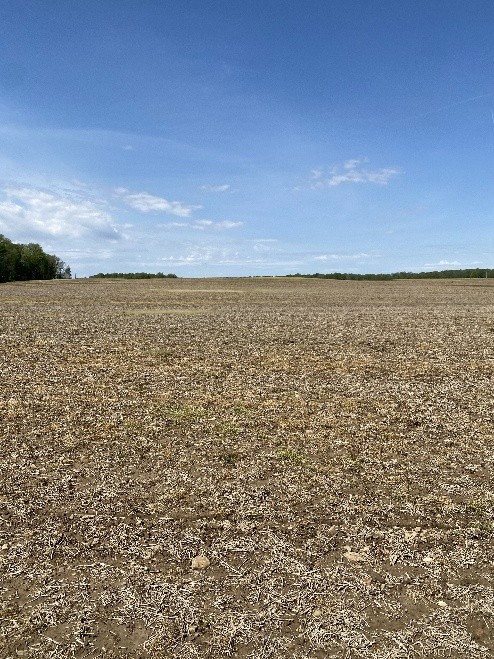
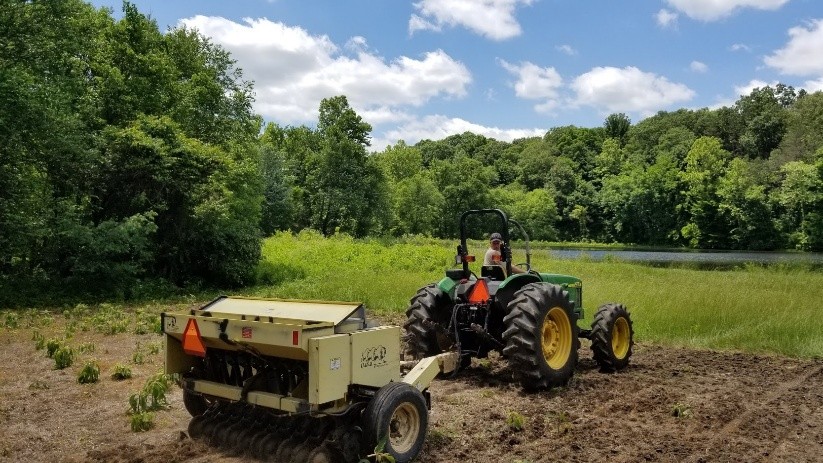
In the first growing season of the stand’s life, multiple growing season mowings will need completed at a height of 10-15 inches. These mowings will reduce the completion the forbs receive from the grasses and allow for a more even mix in the stand. After the first year of establishment, full stand mows should never be completed, and a long-term adaptive maintenance plan should be generated and followed.
Once your stand is an established grassland, maintenance is required. Historically, nature did this for us, but human intervention has allowed many of our natural grass spaces to revert to early successional woodland habitat. The best tool for maintaining grassland habitat is prescribed burns done on 3–5-year return intervals. This will remove the thatch layer from the previous year’s growth as well as kill off any woody vegetation that may have infiltrated the stand. Spring burns encourage native grass growth whereas fall burns tend to generate more forbs or wildflowers in subsequent years. A good goal to keep in mind is to keep ½-2/3 of the stand standing entering each dormant season to provide continued resources and habitat for wildlife. Cycle through the field and by year 2-3, the field should have gone through a completed management round, and it is time to repeat.
Burns can be hard to accomplish with so much red tape in the way, lack of personnel and climatic conditions (i.e. draught) so utilizing mowing and tillage for management is a great alternative. Mowing for stand management should be completed after the primary grassland bird nesting season, March 1 – July 15. I encourage mowing management to be completed by mid to late August to allow for regrowth and better over winter habitat for wildlife and pollinators. Mowing maintenance should take place on 1/3 of the acreage and be cycled through similar to fire management. Depending on how much thatch accumulates on the stand, raking this cut vegetation may be necessary to avoid smothering desired growth and retain access to the bare soil.
Disking is also an excellent tool for creating additional bare ground in a dense stand, as bare ground is part of a pristine habitat for both wildlife and pollinators, and tillage helps rejuvenate the seed bed and allows annuals to flush out again. Be cautious of disking in areas with a history of invasive and noxious weeds, as disking will expose the existing seed bed and allow room for these unwanted species to take off. If this happens, don’t worry. Reach out to your local conservation office and we can help solve the issue, though following up with the establishment mowings during that following growing season is a great place to start to reduce annuals appearing in the plot. Some landowners are interested in the addition of food plots or shelterbelts near or adjacent to their grassland stands, which we can discuss more in another article.
For more information on establishing native cover reach out to Rachel Coy.
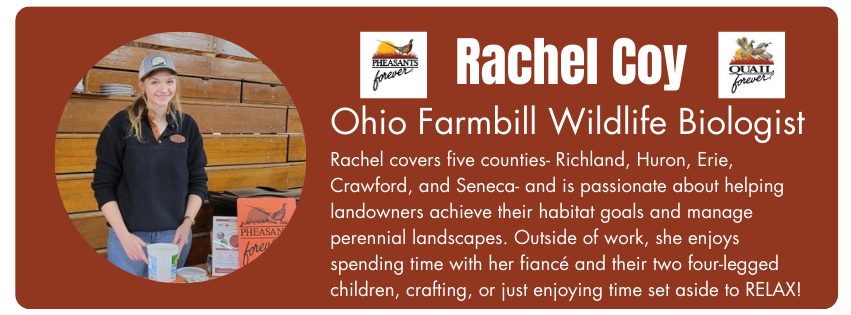
Celebrate 77 years of conservation with us and help shape the future by voting in our board supervisor election!
Save September 11 to attend this year’s Annual Celebration. The Celebration will return to the Area Agency on Aging in Hawkins Corner, 2131 Park Avenue West, Ontario.
A buffet lunch will be served at 11:30am followed by a program at noon to recognize the Cooperator of the Year and Volunteer of the Year honorees and share this year’s impact, accomplishments and updates. The cost is $25 per person and reservations are required by September 4. Reservations may be made online at https://richlandswcd.net/event/annual-celebration-4/.
From 11:30am to 12:30pm, eligible voters may cast their vote for one open Board Supervisor position. Eligible voters shall be at least eighteen years of age at the time of the official election and own or occupy land with the boundaries of Richland County. Absentee voting is also available at the Richland SWCD office beginning August 13 and closes September 10 at 4pm. Visit https://richlandswcd.net/ for election information.
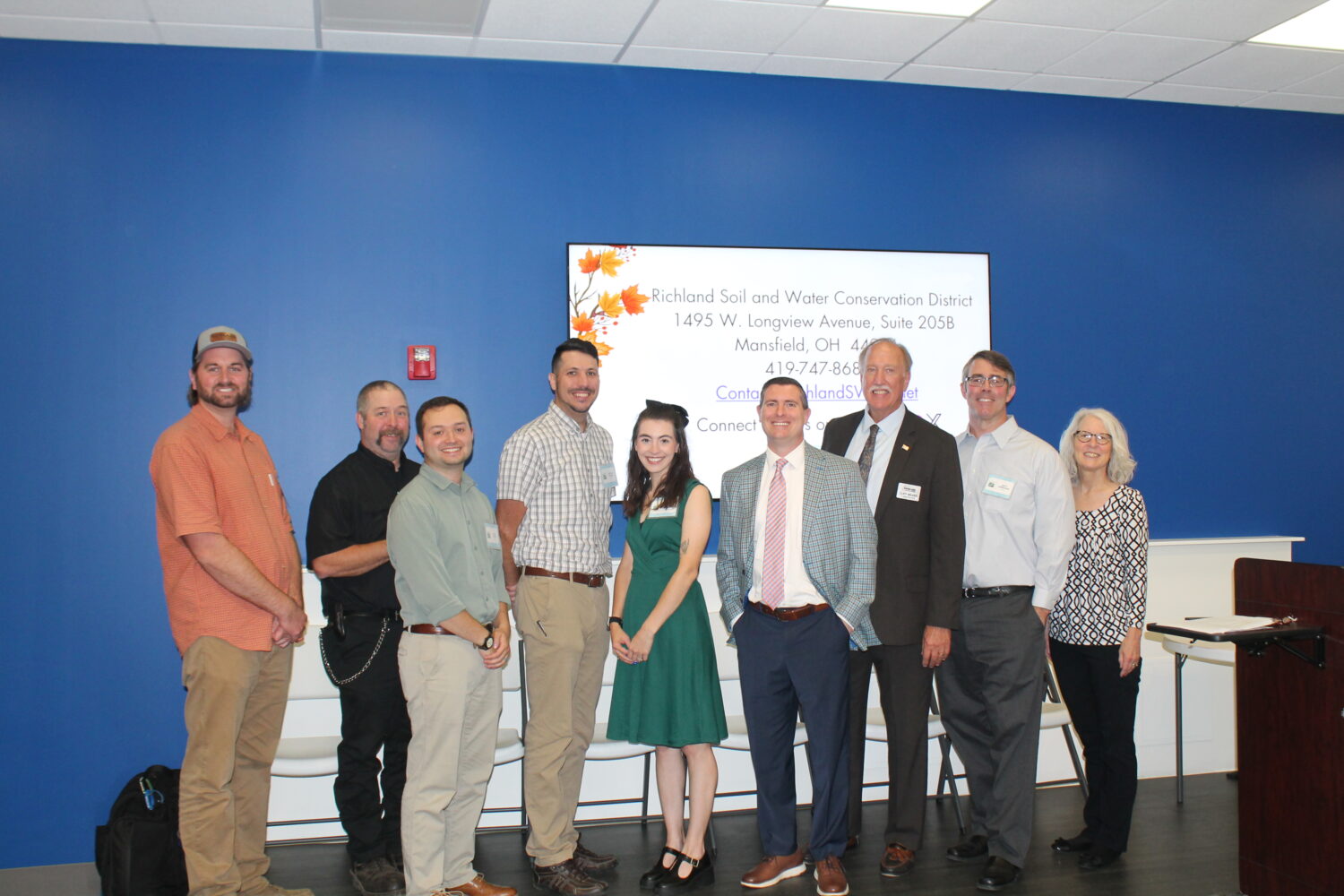
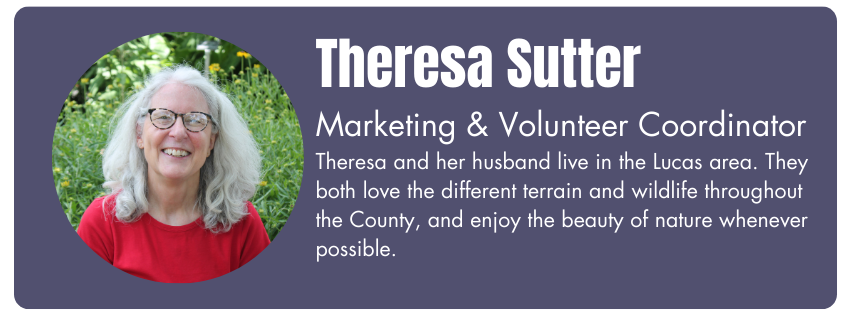
Suiting up for screenings and keeping soil in place! Check out this quarter’s MS4 updates from fieldwork progress to a breakdown of how erosion happens and what you can do about it.
In the second quarter Sam and I continued our work with the Health Department to inspect outfalls that previously had illicit discharges. We re-tested several to confirm elimination and are looking forward to continuing this partnership as we work through a few more outfalls in the coming months. We also attended the MS4 bootcamp at the 2025 Ohio Stormwater Conference where we got a helpful refresher on the six minimum control measures and what to expect during Ohio EPA audits. We’re better equipped literally too! Sam and I both have waders now and we’re excited to stay dry during our final six dry weather screenings this year.
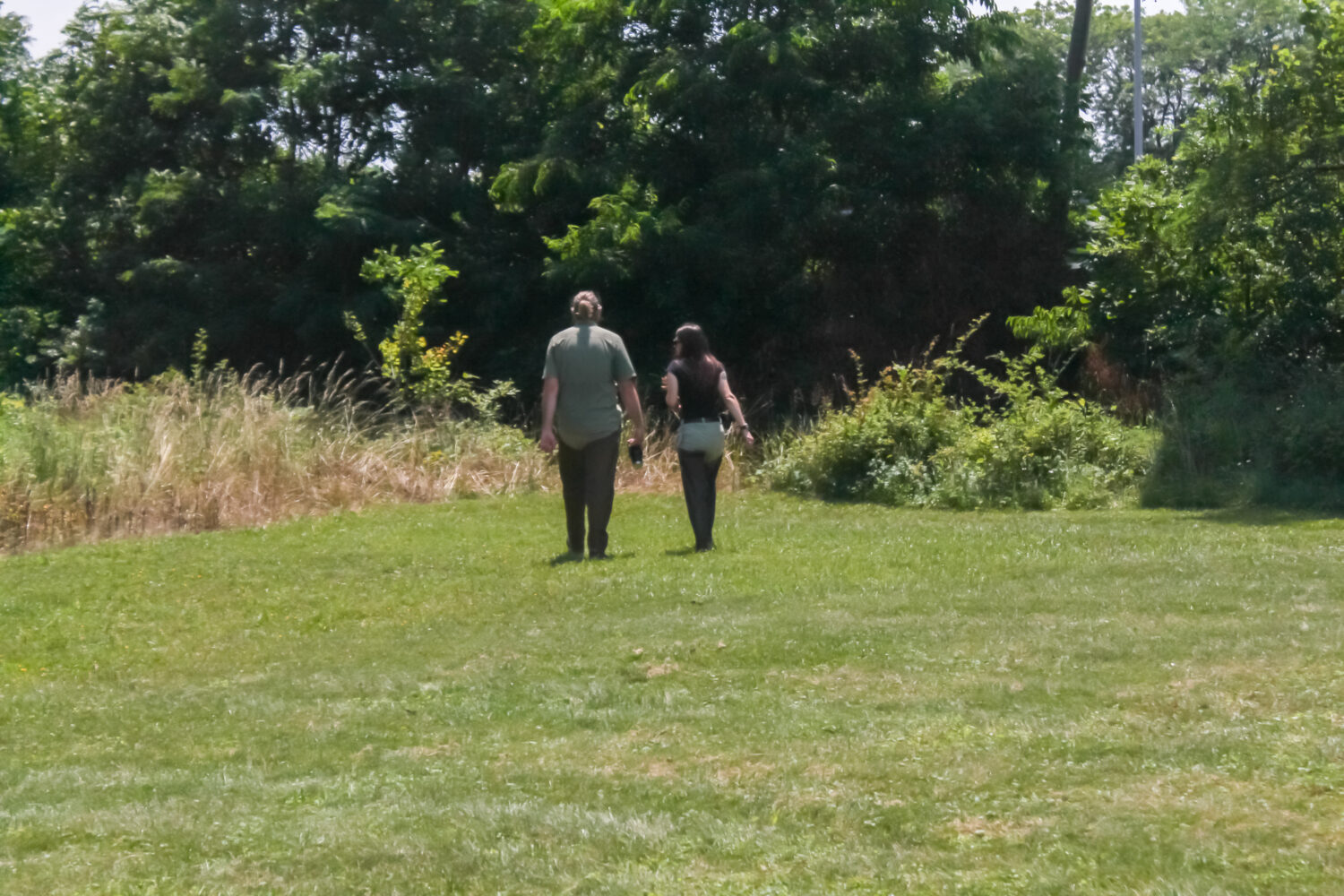
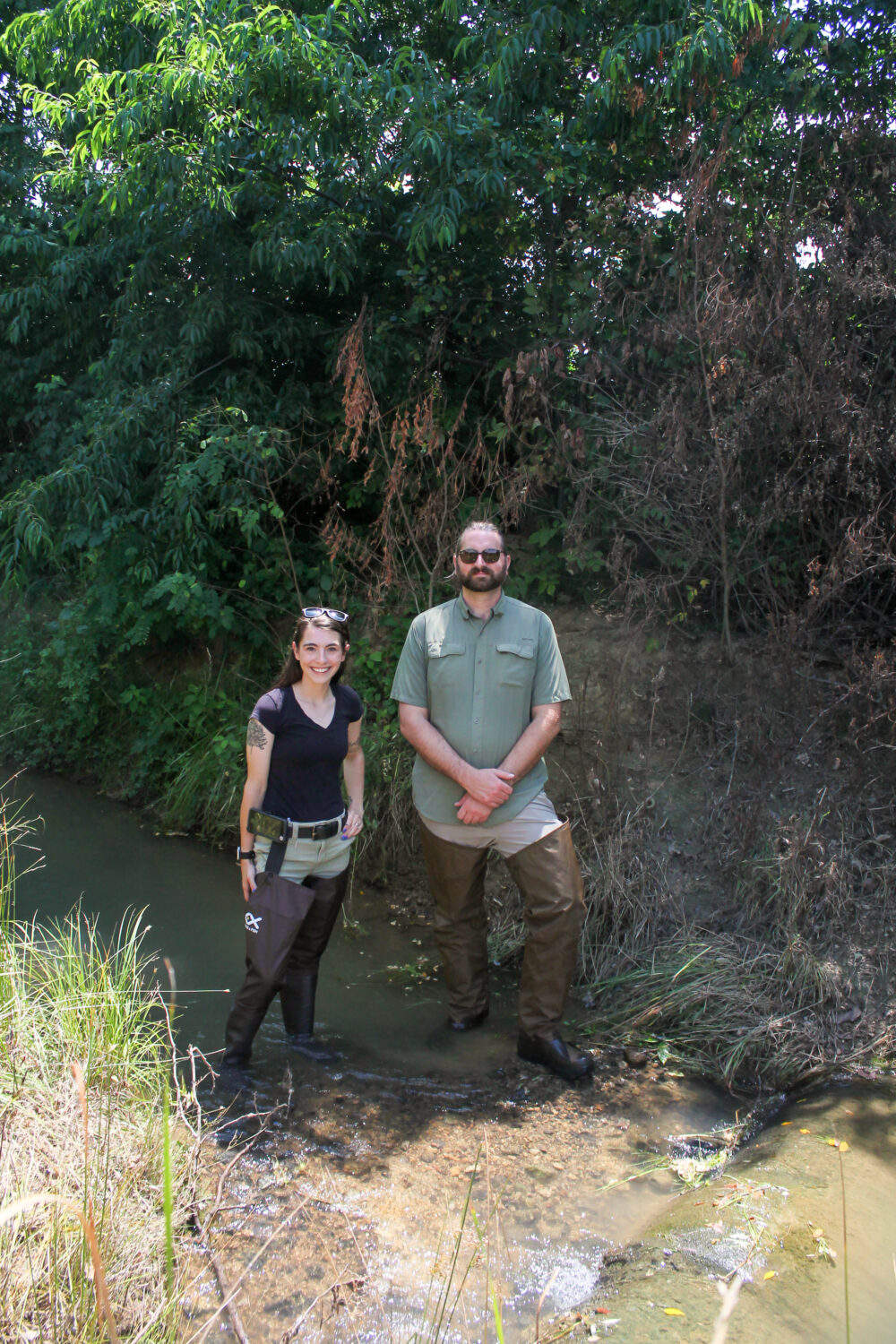
From Splash to Gully: The Many Ways Soil Moves
Keeping dirt in its place is the MS4 theme for 2025 and this spring gave us plenty of reminders why that message matters. During stormwater inspections, Sam and I noticed a significant amount of erosion. So much so that we spent a good part of the spring fielding phone calls about seeding, stabilization and erosion control methods. Rainfall can cause soil to move in several different ways. Understanding the different types of erosion can help us take the proper steps to protect our landscapes. Below are the four types of erosion we commonly observe: Splash, sheet, rill and gully.
- Splash: Soil displaced by the impact of a falling raindrop. According to National Geographic the impact of a falling raindrop can scatter soil particles as far as 2 feet.
- Sheet: Displacement of soil in thin layers by the forces of rain and stream flow. Erosion caused by runoff.
- Rill: Displacement of soil by water running through little streamlets or headcuts.
- Gully: Displacement of soil along drainage lines (large channels) by surface water runoff. Usually begin as rills.
All four types of erosion can quickly get out of hand if sites aren’t stabilized in a timely manner. The best way to prevent erosion is to seed and mulch bare soil as soon as possible. Early stabilization not only keeps you in compliance with the Stormwater and Sediment Control Regulations of Richland County but also protects our waterways. Thank you for doing your part to keep dirt in its place!


Join us in giving Daniel a warm welcome. He’s the grandson of one of our volunteers and our summer marketing intern!
We’re excited to welcome Daniel Karger, our new marketing intern, to the team! Daniel is a student at Ashland University where he is majoring in Marketing. He enjoys playing soccer, guitar and photography. He’ll be assisting us with graphic design, social media, promoting our programs to the community and more. He is the grandson of Donald and Roberta Karger. Donald is a Precipitation Monitor Volunteer for the District. We’re thrilled to have Daniel on board and can’t wait to see the creative ideas he brings to the table!

On April 9, Richland Soil and Water Conservation District proudly hosted the Area 2 Envirothon at Cooke Family Wildlife Conservation Park…
On April 9, Richland Soil and Water Conservation District proudly hosted the Area 2 Envirothon at Cooke Family Wildlife Conservation Park, welcoming over 200 students from across Northeast Ohio. This annual competition challenges students in five key environmental categories: Soils, Wildlife, Aquatics, Forestry, and Current Environmental Issues (CEI). For 2025, the CEI theme is “Roots and Resiliency: Fostering Forestry Stewardship in a Canopy of Change” encouraging students to explore the vital role of forests in environmental sustainability.
Medals were awarded to the teams with the highest score in each of the testing categories. The station winners from Area 2 are:
- Aquatics: Laurel Gators – Green from Laurel School
- Wildlife: BBH Baobabs from Brecksville-Broadview Heights High School
- Soils: Boardman Channel Cats from Boardman High School
- Forestry: Beaver Leaf Legends from Beaver Local High School
- CEI: Beaver Leaf Legends from Beaver Local High School
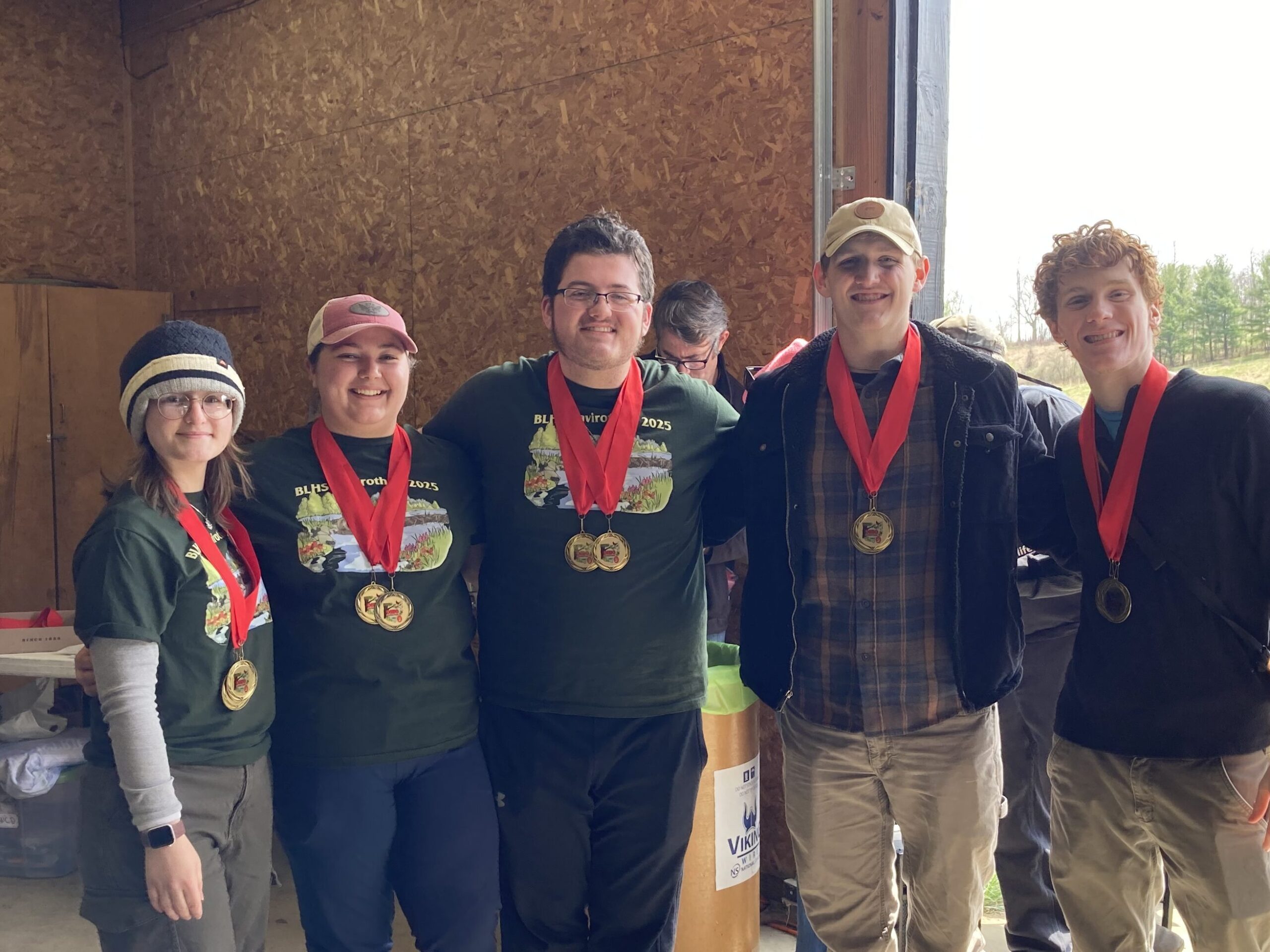
The four teams with the highest overall score (all five station scores combined) will advance to the state competition at Wilmington College from June 2-4. The teams with the highest scores and going to state are:
- Boardman Channel Cats from Boardman High School
- Beaver Leaf Legends from Beaver Local High School
- BBH Ginkgos from Brecksville-Broadview Heights High School
- BBH Baobabs from Brecksville-Broadview Heights High School
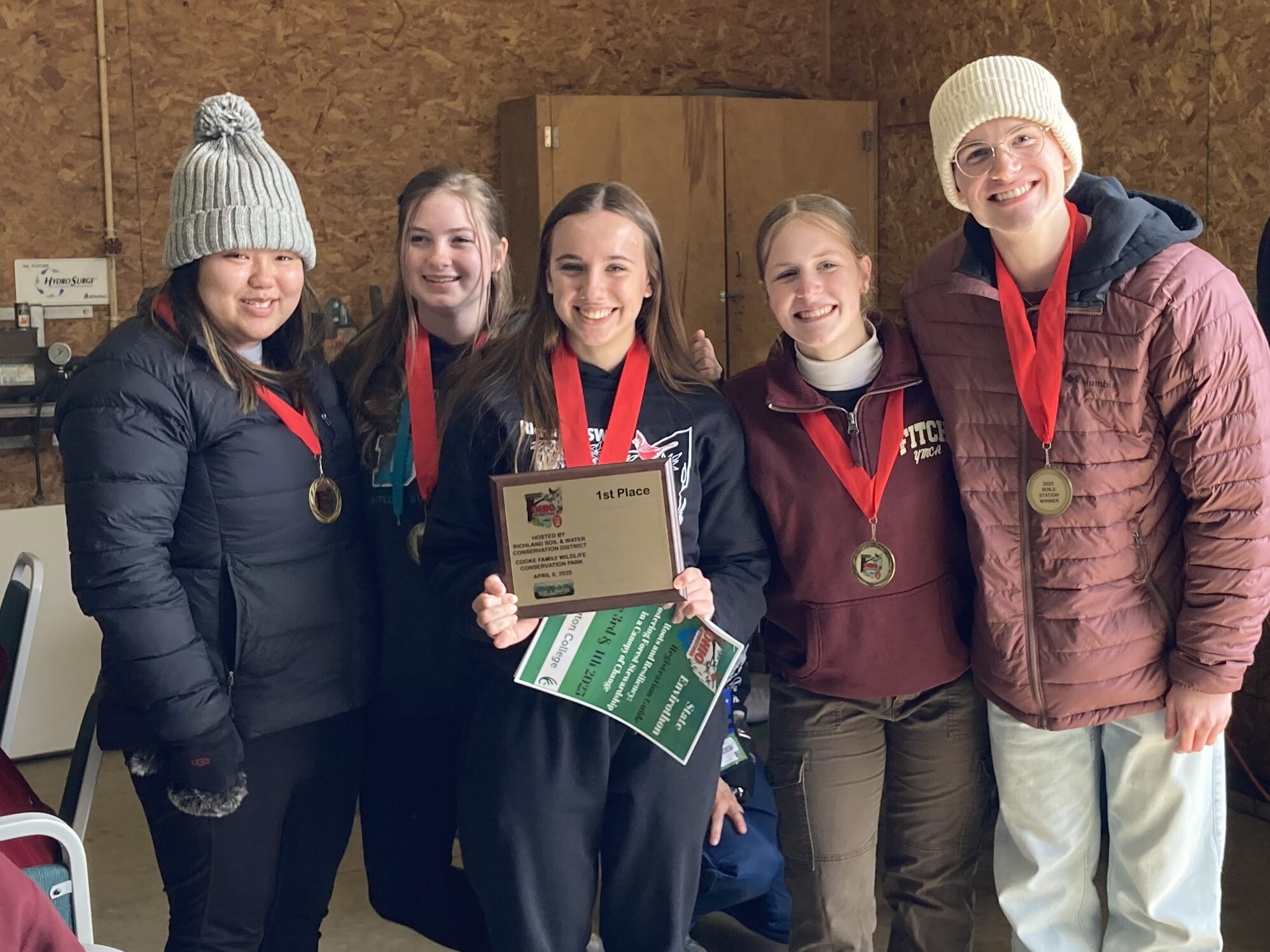
We wish them all the best! The winning team from the state Envirothon will go on to represent Ohio at the international competition in Alberta, Canada from July 20-26.
Advisors were also able participate in the event by touring Fowler’s Woods with a representative from Ohio Department of Natural Resources (ODNR) or they could join an advisor team and also take the five tests. Advisor Team 3 won and was made up of the following members:
- Austin Saverko from Columbiana High School
- Caitlin Miller from Bedford High School
- Jodi Berger from Beaver Local High School
- Danielle Moon from Cardinal High School
- Chris Carman from Theodore Roosevelt High School
- Michael Cochran from Jackson Local High School
Overall, the Area 2 Envirothon was a tremendous success! Students not only expanded their knowledge of environmental topics but also sharpened their decision-making and teamwork skills – all while enjoying a fun, hands-on learning experience. Of course, no event is complete without great food, and participants enjoyed a well-earned lunch of burgers and hot dogs grilled by Crestview FFA volunteers.
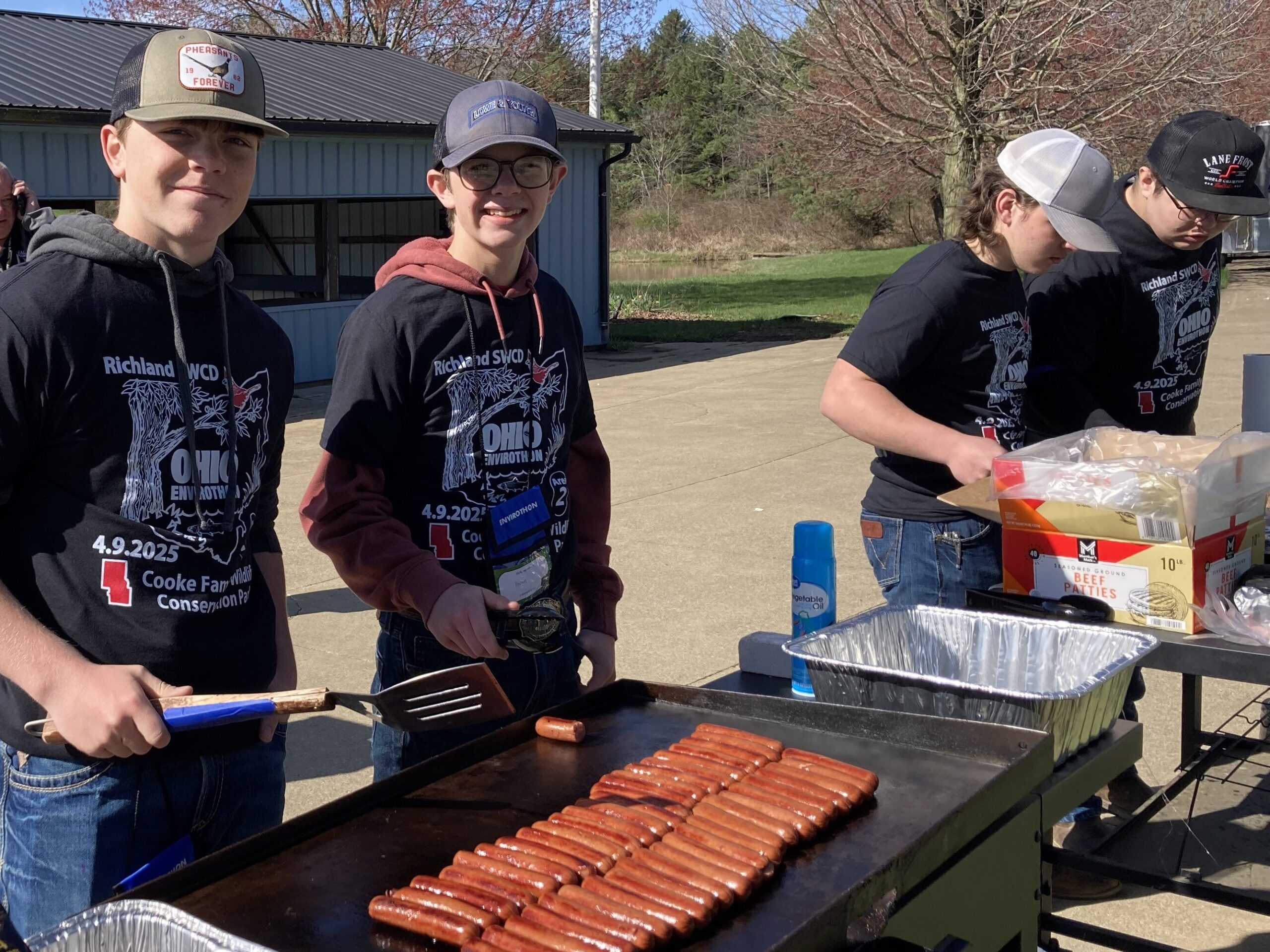
We extend our heartfelt gratitude to our sponsors and many volunteers who made this event possible. Your support helps inspire the next generation of environmental leaders!
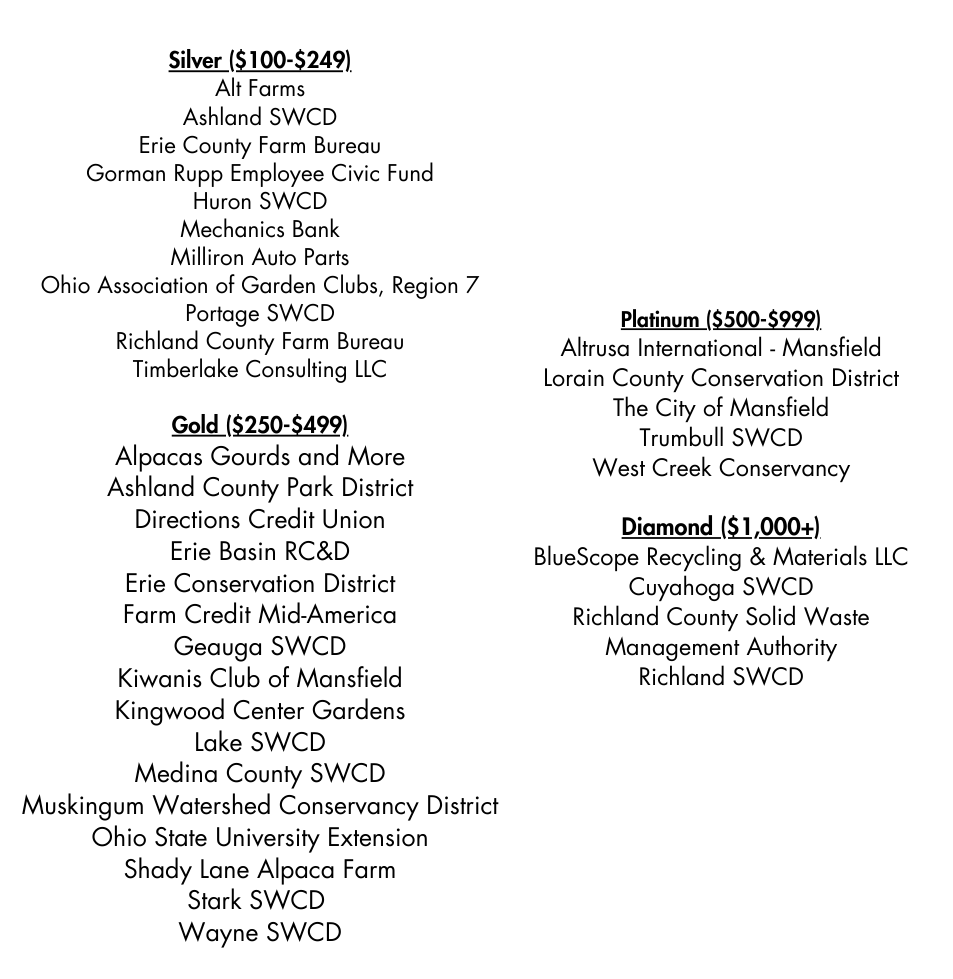

Learn what a sub irrigated planter is, how they work and the benefits of using one in your urban garden!
What is a Sub Irrigated Planter (SIP) and How Do They Work?
- According to Al Gracian “Gardening with sub-irrigation is the process of watering plants from below the soil line. Through capillary action, the water then slowly rises upwards.”
- Wikipedia defines capillary action as “the process of liquid flowing in a narrow space without the assistance of external forces like gravity”.
- Sub irrigated planters consist of a watertight container with a water reservoir, air chamber and peat-based potting mix. You can also utilize a filling tube for easy watering and an overflow drain to ensure the planter doesn’t become water-logged.
- These planters can be used indoors or outdoors. Users can buy retail models or build one themselves!

Sub Irrigated Planter Benefits
- Sub irrigated planters can be used in conjunction with a rain barrel collection system to self-water and provide even more storage after each rain event. This is totally free water that plants love.
- Having a built-in water storage reservoir helps these planters resist times of drought.
- A water-level gauge can be installed to help you see how much water the planter needs. This assists with water consumption because you’re only using the amount of water that the plants need.
- Planters can be used on top of impervious areas (hard surfaces) that would otherwise be rendered useless for growing crops. This helps the urban gardeners reclaim their land as the planter can be placed just about anywhere.
Crops that Grow Well in a SIP
- Annual plants perform very well in a sub irrigated planter. These plants grow for a short time but require a large amount of moisture to thrive.
- Examples Include: Peppers, tomatoes, ground cherries, watermelon, corn, zucchini, squash, broccoli, cauliflower, celery, kale, spinach, lettuce, arugula, radishes, carrots, parsnips, basil, parsley, dill and many other annual plants!
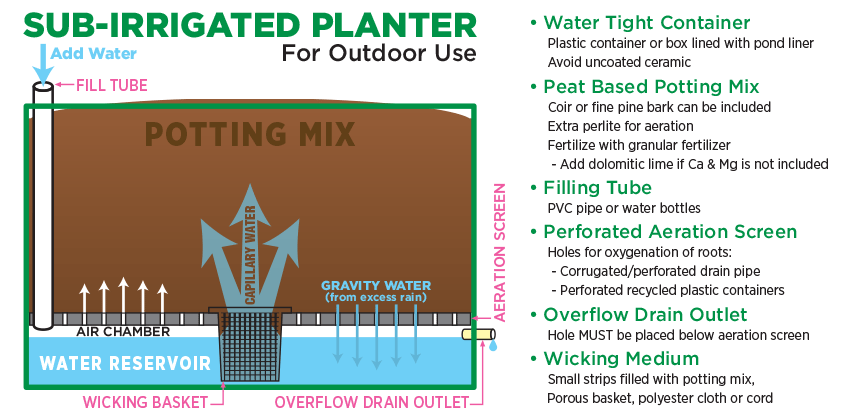
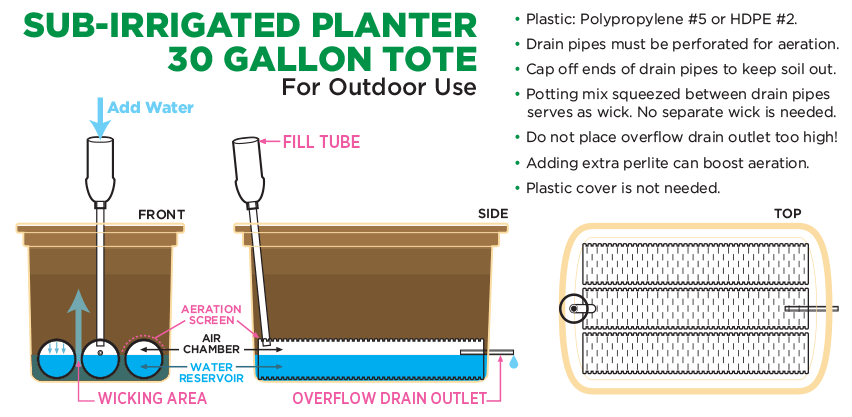
Learn More: http://albopepper.com/sip_expectations.php & https://en.wikipedia.org/wiki/Capillary_action

Springtime brings back warmer temperatures, green plants, beautiful blooms – and unfortunately heavy, damaging rain events.
Springtime brings back warmer temperatures, green plants, beautiful blooms – and unfortunately heavy, damaging rain events. Sometimes an after effect of these heavy rains is streambank erosion. This occurs when heavy rains make their way to streams, dramatically increasing the speed and force of the water. These flow velocities can be too much for the streambank and sections of the soil can be eroded away. In some instances, erosion is significant enough to remove a portion of the property and establish a new streambank edge. Another detrimental effect of this erosion is that soil is washed into the stream and suspended in the water column, which is a type of pollution (See MS4 Update: Why Soil Matters More Than You Think).
There are actions that can be taken to protect stream banks. Mechanical methods can be installed, this would include placing materials such as large rip-rap stone, timber pilings, stream rock veins, rock gabion baskets or retaining walls made of treated timber or metal sheet piling to hold the bank in place. These methods would offer immediate relief, but they can be extremely expensive and if not professionally designed and installed, they could fail in short order.
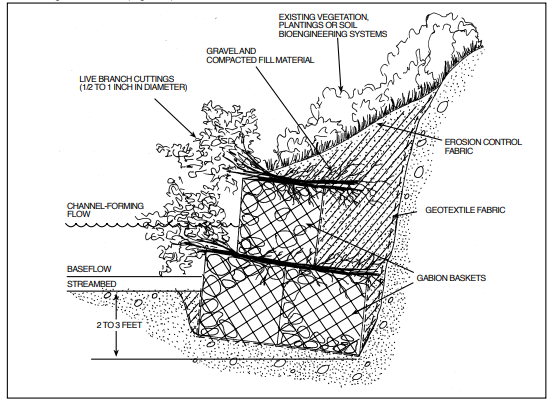
Another action that should be considered would be planting live trees and shrubs. This method requires a little forward thinking and is not an immediate fix, but it is much more affordable and if established properly, could offer a very long-term solution. Trees and shrubs along stream corridors offer their live root systems to hold soil in place and are called Riparian Buffers. The root systems of vegetation resists the force of storm surges in the river and keep the streambanks and the soil in its place.
There are many types of trees and shrubs that would be suitable for this purpose, but I would like to highlight one tree in particular for landowners to consider – the American Sycamore tree. The American Sycamore is a native tree and can be recognized by its mottled brown, gray and white bark that can look like a camouflage pattern. It is typically found growing wild along stream and river corridors and has the largest circumference and leaves of any hardwood tree in North America. It is a large tree with a potential diameter of greater than 10 feet, and a height range between 80 and 140 feet! They are a long-lived tree as well. A living tree was cut down in southeastern Indiana in 1970, it’s diameter was more than 7 feet, and it was found to be 430 years old!
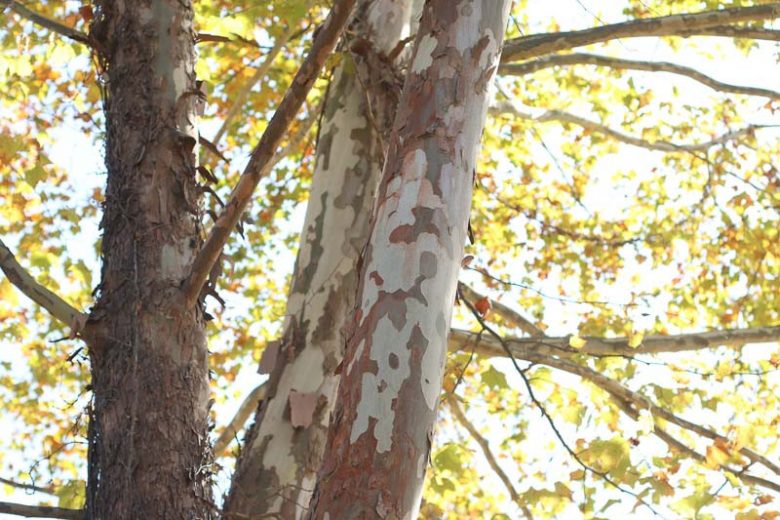
As far as stream benefits, here’s what the Sycamore can offer. Their massive root systems not only hold and secure stream banks, but they also filter out sediments and other surface pollutants from the stream. These root systems also create flow eddies in the stream which can reduce erosive flow and offer resting areas for fish from strong flow currents. Their large size can offer shade to the stream channel too. This cools the water which increases dissolved oxygen and inhibits nuisance algae. The tree itself offers multiple wildlife benefits, it can provide cavities for shelter along with roosting and nesting sites for birds. The Sycamore is the preferred tree by Bald Eagles and the canopy of a mature tree can support a 2,000-pound Bald Eagle nest!
So, the next time you have a chance to drive or hike next to a stream, take a look and see if you can spot this amazing tree. Notice how the roots are securing the streambank and take a peek into the canopy and see if you can spot an eagle’s nest. I hope this will give you a new appreciation for the Sycamore and consider it an option as a streambank stabilization technique.

Learn how thoughtful species selection can create balanced habitats that support pollinators and wildlife all season.
A thoughtfully considered prairie planting is one of the most beautiful sites to see come spring. When you are planning your prairie planting, you want to keep diversity in mind. Diversity in height, bloom time, species, lifecycle, structure and location are key to planning a successful habitat. Native grasses vary from 3 feet to as much as 10 feet tall. Native forbs (or wildflowers) also vary greatly in height but also in bloom time, color, shape and size. I mentioned in my first habitat article that ensuring we have species growing in each bloom time frame is the best way to adequately support wildlife and pollinators.
The early spring bloom window is the most challenging time frame to capture on a prairie planting. Well-behaved, non-native clovers are often included in planting mixes in conjunction with some natives like golden alexander, foxglove beard tongue and some coreopsis species. This window can be supported by planting pollinator/ wildlife friendly trees and shrubs that bloom earlier than herbaceous species, act as boundaries between properties and provide additional cover and forage. Wildlife friendly choices can include American plum, oaks, maples, red osier/ flowering dogwood, spice bush, American hazelnut, crab apple, native willows, pines and more.
The peak summer bloom window is the easiest to hit, as most of our native species bloom from June to August. Some of my favorites are cardinal flower, bee balm, blue vervain and mountain mint, which is also a hit with honeybees (trust me). The late bloom window is dominated by goldenrods and asters, which are essential for supporting migrating or hibernating pollinators and wildlife.
At least three species in each bloom window are encouraged, though more is always better. Species that host native pollinators, like milkweed, should also be included. Plant life cycles are also important to consider. Perennials and biennials will persist through the life span of the prairie planting, but that’s not to say annuals should be left out. Annuals are great to include in mixes, especially during the first growing season as perennials are working on their complex root systems and very little growth happens above ground. Annuals give you something pretty to look at and can re-seed themselves for several years, especially in well managed and maintained stands.
Grassland birds and other wildlife species depend on diverse grasslands. Often the wildflower component is overlooked and only grasses are considered good habitat. Yes, our native grasses and their long seed heads are great forage products for wildlife, and conducive to chick mobility, brood rearing, and nesting. However, forbs are what attract the invertebrates that make up a huge portion of birds’ diets.
It is essential to consider continued management when planning your planting. Prescribed fire is one of the best tools available for maintaining early successional habitat. If you’re planning on utilizing it as a tool in your planting, planning burn breaks is essential. Burn breaks are strips of low-lying vegetation, or bare ground, that maintain moisture, green cover, or a lack of cover through much of the year. Clovers fit the bill perfectly. If burn maintenance is something you want to implement but didn’t plan burn breaks into an already established prairie, repeated tillage can achieve a similar result prior to a burn being implemented.
Site conditions are also important to consider when planning a prairie. Upland sites are some of the best locations for planting prairies, however low land/ wet sites can also be successful. Choosing species that suit drainage, sunlight, and soil properties is essential. What does your surrounding habitat lack? Are there gaps you could fill? Are there enough forbs? Too many grasses? This is where things can be fun and very specific to your site. If you’re considering planting a native prairie on your property, please reach out and we can start planning!
